#so they can be referenced for forensic testing
Text
My live reactions while listening to Batman: Unburied
Listening to Batman Unburied. It’s SO good. Bruce Wayne is a forensic pathologist and his parents are alive and he’s trying to catch a cannibal called the Harvester except it’s all in his head. Back in the real world Bruce Wayne is “dead” and Barbara is the real main character other than Bruce. Batman is not batdad in this, which is fine, but it’s weird that Barbara is a character but Dick is not.
WAIT FUCKING WAIT IS THAT JUSTIN MCELROY? THE MCELROYS ARE IN BATMAN UNBURIED?? WHAT???
I’m loving DC deciding to put Riddler in more stuff instead of the Joker. Joker’s overused.
Why did riddler saying “it’s mr.nigma” sound like he introduced himself as Mr.Ligma lol.
“Ace has mostly stayed by the window waiting for master bruce.” Awww Ace.
LOVING riddler in this. He’s so funny. Also loving that this is Barbara focused. And they got a diverse cast.
So Bruce was actually getting better and healing from his parents death only to feel super guilty when he realized it and decided to push everyone away. Unburied has been reminding me of BTAS. Bits and pieces of things happening here have happened in BTAS before. The forgetting he’s batman, the psych evaluation with a lightshow,referencing gray ghost, living in an alt reality in his head where his parents were still alive, and now Batman feeling guilty he’s moving on from his parent’s murder while dating vicki.
There’s griffin and travis on Ep 4!
The conversation between bruce and his parents at the beginning of ep 5 OH MY GOD! YAY! I love this; it’s SOOOO good!
So Hugo Strange is the real villain! Now Bruce gets to beat up the Mcelboys.
Ep 6 riddler. dude. He’s so silly. “Ah hoy hoy! You need me on the fairway. You need me for luck. But once you have me, you’re well and truly fucked.” Silly man! I love the riddler in this! “The improbable jawline beneath the cowl.” this man truly did play riddler gay (and we wouldn’t have it any other way.) i love riddler in this SO MUCH.
WHOA TWIST! RIDDLER DIDN’T STAB GORDON!
“This city and its cartoon bullshit”.
Strange is DEAD? Did his own guy kill him?! The cannibal dude? No, not that? Strange isn’t behind everything?
WOAH batman’s doing the thing his subconscious Brucie does. HOLY…REALLY?! Is that new or has this batman always done that?
So it’s MadHatter? No, not him either.
Something about batman villains cursing is so funny.
BATMAN APOLOGIZED? Like it was nothing!
Dude! Connecting cannibalism with eating the body of christ.
Wow they’re bringing in all the villains except joker here. There’s ivy!
He doesn’t know ivy’s name?
This is a new backstory for her i think. Her dad makes bioweapons? And he fucking tested them on her! That’s so fucked up! Wow this guy sucks so bad, he even killed his wife bc she cared about her daughter.
She had a girlfriend named Alex in college in this! neat. (i think this ivy and stiefvater’s swamp thing would get along) uh oh i think something bad is going to happen to Alex. Ok she’s fine she just didn’t like Ivy killed a guy. Ivy can’t kiss anyone in this universe. Huh.
So bc bruce tried to protect this tree, that’s what led to ivy and strange working together.
Obv he chooses vicki. He can always catch the bad-people later.
AH fuck! Batman is compromised! AH what a cliffhanger right before the last episode.
“Leaping lords, gray ghost!” GRAY GHOST HAS HIS OWN ROBIN??? NAMES POLTERGEIST!!??!? AAAHH!
“You chose a world where we were disappointed in you” OOF
OUGH there’s Bruce feeling guilty he’s moving on from his parent’s death! In his own words! “It’s not just about you anymore. I LIKE it.” YES YES YES YES. “we don’t have to be the first thing you think about when you wake up” T_T
NOO ALFRED’S BEEN COMPROMISED!
“I have something you don’t. I have a dog.” LOL
YOU CAN’T KILL OFF ISLEY!
Bruce apologizes AND TELLS ALFRED HE LOVED HIM!!!!!
The final message of unburied: ACAB.
Looks like ivy’s still alive. And she got back together with her ex.
Why does bruce interrupting riddler’s dinner sound like a date and flirting?!
overall review: 10/10
6 notes
·
View notes
Text


(Previous Post)
Dear dawsongfg,
Mod Edgeworth: Also, the updated animation, the return of Ema Skye, the return of using forensics as part of the investigation, Trucy’s introduction, Klavier’s introduction, Apollo’s introduction, the best tutorial in all of Ace Attorney, having each case connected more than the other previous games, the introduction to the Dark Age of the Law, placing Phoenix in a situation that tests his morality, might I say more? Honestly, the hate for the game Apollo Justice was overblown. The only things I didn’t like about it was the MASON system, the intro to the Jury System and how boring the trial for Turnabout Corner was. Beyond that, I absolutely loved it and, if not for Miles Edgeworth Investigations 2, this would be my top favorite with Spirit of Justice.
For the first DGS, I’ve only played through the first three chapters. And this man...

I... I think I’m in love.

Co-Mod: I’m just going by what the wiki says, so he’s Mr. Furst as far as I’m concerned. That won’t be official on this blog for a little longer, of course, so enjoy “Adam Ladyfirst” while it lasts.
To put it simply, I’m absolutely loving the Chronicles games so far (not that I wasn’t expecting to)! Even knowing how the first game’s plot goes, it’s been pretty nice to see some of the details I was unable to enjoy when I was just watching the fan localization, and the writing -- both the part I’m familiar with and the new stuff -- keeps making me laugh. Needless to say, I’m eagerly awaiting some good moments in the second game as well.
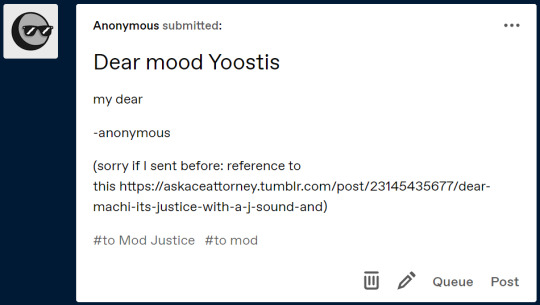
(Previous Letter)
Dear anonymous,
Mod Justice:

Machi, learn to English better before I run out of patience. I'm already low on it enough as it is.
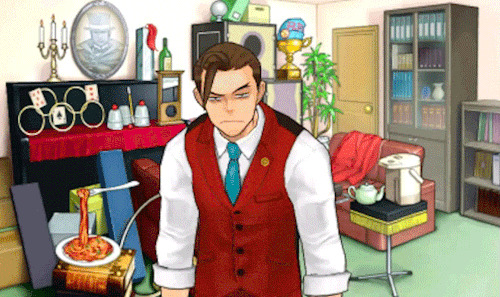
(With all this bullshittery with that “Dawsong” guy, along with other “Anonymous” individuals that may or may not be him, it’s as if people don’t recognize that I’m GODDAMN HUMAN here. Inconsiderate jerks...)
Co-Mod: *pats Mod Justice on the back*
We appreciate all you do here.

(Previous Letter)
Dear dawsongfg,
Mod Edgeworth: I LOVE coffee. I like it strong and bitter with a bit of cream and sugar.
Co-Mod: Same here, although I prefer to use creamer, my favorite flavors being French Vanilla, Hazelnut, and Pumpkin Spice. I’m a creamer connoisseur, I suppose you could say.

(These Referenced Links)
Dear Anonymous,
Co-Mod: That’s, erm...definitely a creative idea, but if the robots we’ve seen in the Ace Attorney universe are really the cream of the crop...

...Yeah, I can’t see it happening.
I kind of like the idea of characters writing the plot for future games, though. If anyone can come up with challenges for the protagonists, it’d be them.
Mod Justice:

..........................................

Alright, Reddit user “u/JC-DisregardMe,” since you were the dips*** that came up with that ASININE “Theory,” you need to pick your poison. Do I send the Oldbag or Filch to your house?
(GODDAMMIT, MATPAT!!!! Thanks to your STUPID “Link is Dead” video, I’m seeing similarities between your video and THIS sad excuse for a “theory.”)
(As if MangaKamen never said he was DONE with MatPat in the first place... UGH!!!!)
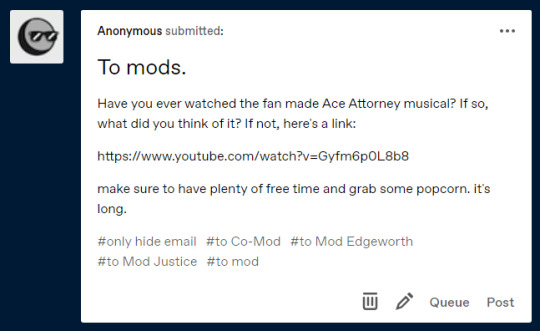
(Referenced Video)
Dear Anonymous,
Co-Mod: I’ve only seen parts of it, but I’d love to take in the whole musical someday. Many of the songs in it were written by Matthew Taranto, a favorite webcomic artist and composer of mine, and his wife, Sarah, so I know it’s bound to be high-quality stuff. Even putting that aside, I appreciate the effort it must take to combine a great story with original music, as well as adding and changing some of the lines (kind of like we do here), so kudos to Diana Papparozi, Sarah Shope, and everyone else who took part in putting that together.

Dear Phoenix,
Mod Edgeworth: I’m going to give you a piece of advise in the most sincere and kindest way possible.... get help.

Dear 91teivos,
Mod Edgeworth: Okay, I only censored that one to give an example of what my censoring would look like. I don’t mind you using the derogatory word for sex. Co-Mod is the one that censors words like that. If I do, it will be left with a warning for language. I personally feel uncomfortable with censoring words without giving everyone the choice to read it or not.

My limit is anything that goes past rated T or acceptable to Dual Destinies, which is rated M. When it comes to words, context is key. Maybe it’s because I’m from Texas, but I see cuss words as small potatoes when compared to Dual Destinies, which included a 12-year-old dissecting her mother, because she thought humans can be fixed in the same way as robots. If it goes past that, then I will leave a warning.

Dear Anonymous,
Mod Edgeworth: You weren’t the one I was talking about, but you did write more Mod Letters than needed. So, thank you.
-The Mods
7 notes
·
View notes
Text
attention
summary: you give Pope all your attention one Boneyard party, and he loves it.
word count: 2.3k
based off of the first half of this blurb I did a while back!
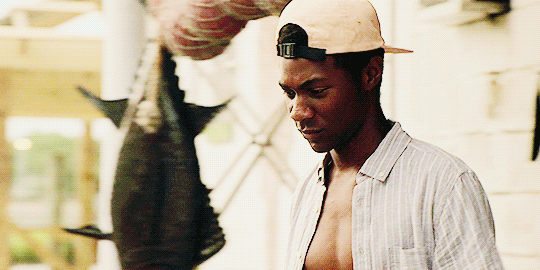
The Boneyard, though named ominously, was actually one of the least scary spots in Kildare County. Well, as long as a crowd of drunk teenagers didn’t scare you. It was one of the only spots where class didn’t matter, no one cared who filled their cup as long as they had a good time.
Pope Heyward didn’t drink, at least not often, but he frequented the parties on the beach. His friends were usually the ones to throw the parties and he was content to spend his time with them. Usually.
“Uh, guys? Who’s that?”
Pope interrupted John B’s story. His attention was no longer on the brunette, but instead across the beach on the group of Kooks that had just arrived. He recognized most of the approaching figures, Topper, Kelce, and Sarah, but then he spotted you trailing beside the blonde girl.
Kiara told him your name, and Pope repeated it quietly. He liked the way it fell past his lips, the way it tasted sweet on his tongue. His gaze stayed on you, even when JJ swung an arm around his shoulders.
“She’s hot.” That got Pope’s attention, because you were so much more than hot. His head swiveled toward the blonde so fast he might’ve given himself whiplash, only to find JJ looking at him with a smug look. “You should go talk to her.”
“What? No, no—” Pope started to deny, stepping away from JJ and sliding out from under his arm, but Kiara perked up.
“You should! She’s really nice, I promise.” The dark haired girl nodded, and Pope raised his brows in a silent question. Kiara didn’t talk about her Kook year often, and she definitely hadn’t mentioned you.
“If she’s so nice, then why is she hanging out with—” Once more, Pope started to deflect but was cut off, this time by what he saw across the beach. He was trying to use you hanging out with the very Kooks that made his life a living hell, but shut his mouth when he spotted your annoyed expression.
“Do you ever shut up, Topper?” He overheard you huff. In the short time that Pope’s attention had been on his friends, the group that you arrived with had taken up residence on some logs around a bonfire that someone had set up. Topper had sat next to you, and Pope turned back around at the exact moment you shoved the dirty blonde’s arm off from around your shoulders. He watched as you crossed the beach, a sour look on your face as you headed towards the keg.
“Yeah, you’re going to talk to her.” John B decided. He had never seen Pope so enthralled by someone before, and he wasn’t going to let him pass up the opportunity to get to know you. He nudged Pope in the direction you were and continued. “Go on.”
Pope shot his friends a nervous look, but continued towards you anyways. He tripped on the sand, stumbling a bit as he approached. He spun around in embarrassment, ready to give up completely but Kiara, John B, and JJ were all gesturing for him to continue on. With another nervous look, he turned back towards you, and he thanked whatever higher power was above that you hadn’t seen any of his mini freakout, too busy pouring yourself a drink.
You felt Pope’s presence before you saw him. At first, you thought it was Topper coming over to continue trying to convince you that Pogues were really as dangerous as he claimed, and you looked up to the newcomer with an annoyed expression.
Pope nearly retreated with his tail between his legs when you looked up from your cup with a scowl on your face. But then your expression softened to an almost apologetic smile as you seemed to take him in.
You realized quite quickly that it wasn’t Topper chasing after you, and instead another boy. He wasn’t a Touron, you could tell by the way he didn’t look completely lost—a little nervous, yeah, but he knew what was going on. He definitely wasn’t a Kook, but you had seen him somewhere before.
Pope still hadn’t said anything. He had been standing in front of you for what felt like hours without saying a word. It had honestly been a few seconds, and somewhere deep in his mind he knew that, but it was like alarm bells were going on in his head, screaming ‘you’re blowing it!’ the longer he stayed quiet.
“Heyward’s!” You exclaimed, a look of realization crossing your face. Pope honestly would have been surprised that you knew his name, but he was too distracted by the sound of your voice. It was sweeter than your name, and Pope knew he was completely hooked. “You work at Heyward’s, right? I swear I’ve seen you delivering groceries.”
“Yeah, that’s my dad’s business.” He nodded, probably much quicker than he needed to, but at least he was talking. Maybe he had a chance with you after all. “I’m Pope.”
But then he extended his hand. For a handshake. He had practically doomed himself. In the distance, he could faintly hear JJ’s raucous laughter at his expense.
By way of miracle, you didn’t laugh in his face and run back to your friends. Instead, you gave him your name and shook his hand with a grin. He felt like he was going to combust with your hand in his, and only when you retracted your touch did his mind clear.
“Do you want to go sit?” You boldly asked, and Pope nodded, not trusting his voice. You smiled at him again, taking a sip of your drink as you watched his jaw drop for a second. It was cute, you thought, how obviously you affected him.
“Uh, yeah. Yeah.” He stuttered, feeling his heart beating nearly out of his chest. You thought he was adorable, and led the way to a sparsely populated bonfire. You didn’t know the Tourons that sat opposite you, but were more focused on the dark haired boy sitting beside you.
“So, tell me about yourself, Pope.” You tested out how his name felt on your tongue, and you were pleasantly surprised by the butterflies that erupted in your stomach. You listened with a smile as he told you about how he wants to go into forensic pathology, and though he thought he ruined it once more when he talked about the specifics of the job. Though he expected you to run off, you did the opposite by turning the conversation to his scholarship.
It was going great until Topper approached.
“If you’re done trying to prove a point, we’re heading home.” Topper looked at you with a bored look on his face. You scowled, knowing he was referencing your previous argument with him about Pogues.
“I’m not proving anything, Topper. And I’m not going back with you guys. I’ll walk.” You told him, turning away from him and back to Pope, wanting to go back to your previous conversation. Pope looked a little confused, but you could tell that he was mostly stressed about Topper’s presence. You knew there was a history of bad blood between the two groups, and though you had never been witness to anything, you had heard stories of Topper getting into fights with John B and JJ, Pope’s closest friends.
“Are you sure?” Topper asked, gaze flicking to Pope with a look of disdain. The dark haired boy felt a surge of courage run through him while under your gaze.
“Yeah, I’ll walk her home.” Pope cut in boldly. Then, as he realized his own words, he worried that he might have overstepped. There hadn’t been any indication that he would be doing so, but he really wanted Topper to leave and that was the first idea that popped into his head.
And for what felt like the thousandth time that night, you eased Pope’s panic with an unexpected move.
“See, I got it covered. Bye, Topper.” You waved sarcastically. While you spoke, you placed your free hand on Pope’s knee, an action that had his eyes widening. He was grateful you weren’t paying attention to him, because he was certain he looked like a fool.
Topper didn’t say anything else, instead he rolled his eyes and retreated back to the rest of the Kooks who were waiting for him. To Pope’s dismay, you removed your hand after he left, but it was probably for the best. He couldn’t think straight under your touch, and he had to put all his focus into not saying something stupid and embarrassing himself.
“Thank you, for that.” You genuinely smiled at him. You were in too good of a mood to deal with Topper, and the prospect of getting to spend more time with Pope was not unwelcomed. “He can be such a dick sometimes, you know?”
And because things had been going so well, Pope decided he needed to put his foot in his mouth.
“Yeah, I do know. He beat the shit out of me and some of my friends a few days ago.” He figured it was probably so unattractive to you, that he couldn’t hold his own in a fight like JJ or John B could, and there he was, advertising the fact he got his ass handed to him. You frowned, and he thought he was done for, but then you were glaring at the back of Topper’s head as he retreated off of the beach.
“I can’t stand him, our parents are business partners so they think we’re going to be best friends, but he’s intolerable.” You groaned, turning back to Pope. Your expression had morphed into one of concern, soft eyes studying his face for signs of damage. You drank just enough to not question your actions as you reached a hand out to brush your fingers along his jawline, while Pope himself felt like his heart was going to beat out of his chest. “Are you okay?”
“I’m, uh, I’m fine.” Pope cleared his throat after stuttering, and you grinned as you once more retracted your hand. Thankfully, conversation turned to a less embarrassing topic for Pope, and you chatted for another half an hour before there was another interruption.
“Yo, Pope, we’re headed back to The Chateau.” John B called out as he, JJ, and Kiara approached. You smiled at the girl, having had a few classes with her at the Kook Academy.
“Yeah, are you coming or what?” JJ was smirking, much to Pope’s horror. You stood up, brushing sand off of your clothes from sitting on the beach for so long.
“Are you still going to walk me home?” You turned to Pope with a questioning look, and before he could respond, his friends spoke up for him.
“Yes, he will.” Kiara replied at the same time as JJ and John B nodded their heads. You laughed at their antics as Pope climbed to his feet beside you. He shot his friends a glare, and after a short goodbye the two groups parted ways.
The walk back to your house was filled with mindless chatter, the both of you much too focused on the way your hands slightly brushed together. Your heart felt like it was leaping into your throat everytime your fingers brushed against his, and he was certain he was going to pass out. After what felt like an eternity, you gathered the courage to take his hand in yours.
Pope was so shocked he lost his footing and stumbled.
You giggled, but didn’t acknowledge it.
He felt like he was on top of the world, and simultaneously wanted to crawl under a rock and hide.
Eventually, you did reach your house, and Pope followed you to your front porch. Your parents were off on some business trip, so you weren’t worried about them interrupting. You took your time finding your keys, hoping that Pope would make a move. Instead, he said goodbye and waited until you slipped inside to head back towards the road.
Pope felt like he was missing something, like he shouldn’t be leaving without telling you how much your company and attention meant to him. But it was too late, you were inside already and he didn’t have the courage to go back and knock. He’d just have to pray that you’d show up at the next party where he would be able to—
“Hey, Pope?” Your voice had him spinning around to find you standing on the bottom step of your porch. He had been so caught up in his thoughts, he hadn’t heard the door open and shut.
“Yeah?” He questioned moving to stand in front of you. You smiled at him, hesitating just a moment as a result of being under his soft gaze.
“You should probably ask me on a date now.” Your tone was light, though you were completely serious. You chuckled at the way his eyes widened, and he was nodding before he could formulate words.
“Uh, yeah, Yeah. I should.” He stuttered, a surprised smile making its way onto his face that made your heart leap. “So, do you want to go on a date with me?”
“Yes, I do.” You grinned, letting your own smile grow. You leaned forward, pressing kiss to his cheek before saying goodbye again. You had already exchanged numbers earlier in the evening, so he knew how to get a hold of you.
Pope watched in awe as you retreated back inside your house, and as soon as the door shut behind you, he was pumping his fists and cheering out of pure glee.
You leaned against your door as soon as you shut it, pretending not to hear Pope celebrating on your front lawn.
You both were smiling like fools.
#pope heyward#pope heyward imagine#pope heyward oneshot#pope heyward x reader#pope heyward fic#outer banks#outer banks imagine#outer banks x reader#outer banks fic
198 notes
·
View notes
Text
Chapter 2 of Trapped is up! please let me know what you think ;3
Summary: A woman disappears. She shows up two days after her husband reports her missing, gives no explanation of what happened and takes her own life the next day. Is she the only victim? Is it really suicide? And what happened when she went missing?
Bright and the team investigate the mystery, and Malcolm finds himself in danger yet again. Will he come out unscathed?
AO3
Read Below.
Additional Tags: Implied/Referenced Suicide, PTSD, Claustrophobia, Panic Attack, Kidnapping, Implied Brightwell
note: This chapter has mentions of suicide, nothing is explicitly described, but please be warned. Note: I am sorry in advance if any of my medical knowledge or drugs is unrealistic. I just had an idea and I am rolling with it.
Chapter Two: Edrisa Brings in a Case
It was a good day. He navigated the streets of New York City with ease. His footsteps were happy, bouncy even. And why wouldn’t they be? There is a Case Afterall!
And nothing makes him happier. It’s not like he enjoys murders.
No.
He just likes to catch killers, bring them to justice. He wants to protect his family and his community. He's told John Watkins that already. He also admits that it keeps his mind off things. Keeps things at bay. It's also a good challenge, a euphoric experience. Almost like ecstasy. That all he admits.
But what he fails to admit is that he feels it's his personal mission to atone for what Dr. Martin Whitly has done. The pain he has imposed on the world. The wounds he inflicted. Wounds that did not only affect the victims and their families but also his mother, his sister, and himself. Wounds that cannot heal. Wounds that continue to bleed twenty years later.
No.
He does not admit any of this. Because this thought redeems him, makes him a good person. Like some good Samaritan who saw the world was suffering and decided to help. But he knows he's none of that. "We are the same." He is not a good person. He's just to blame for what his father did. He is not any better. He is broken.
Yes.
He's serving his penance. Atoning for those sins, he somehow feels responsible for. And even though he can't seem to close the old wounds, he was at least sparing others the all-knowing pain. That’s why he loved his job at the FBI. This is why he loves working for the NYPD.
Today was a different case, though. It wasn't Gil who called him, like usual, but Edrisa. He could feel her excitement radiating from the text. Or rather a string of texts. Edrisa was the type of person to shoot 10 texts to get through one idea. Blurbs of text came to his phone as he was sipping his morning coffee.
Bright!!!
You need to see this!
I need to talk to you.
It’s about a case.
Like a very cool one!
ASAP.
Really! It’s a good one!
He was out of the house as soon as he read the word case. Malcolm liked Edrisa. He could always be himself with her. She doesn’t judge him or give him creepy glances when he’s fascinated by murder. She's actually into the same things he likes. They share the same fascination for science and anatomy. He’s grateful for his team in the NYPD, more so now that he feels accepted by them. However, Edrisa was the first to accept him right away, and for that, he will always be grateful. After years of being considered a freak, bullied, harassed, and looked down upon, bright couldn't shake the amount of relief he felt about being so fully accepted and so fast. Even when she knew who he was, what his father was.
He reached her office, and through the glass window, he saw her frantically typing on her computer. Her eyebrows were creased, and she was deep into whatever was on the screen that she startled when he opened the door.
"Bright!" she exclaimed, "what took you so long! Come…come in quickly."
She was hopping on her legs, and in her hurried pace, she managed to hit her funny bony. "Aow Aow Awo,” she repeated and muttered, “why does it always hurt that much.”
Malcolm smiled. It was a quiet and rueful smile, the only smile he ever gives. She doesn't remember ever seeing him truly smile.
“ Hello Edrisa,” he looked at his watch, “I had to walk here. Your texts said you have a case?”
“ Yes, yes, YES," she said with a pointed finger up in the air while navigating back to her desk, and he followed to sit at the chair there. "Okay, so it's not really a case per se,” she said and saw his shoulders drop. “Wait, I mean it is, I really think it is. But when I spoke to Gil, he did not see it.”
He frowned, "Why would, Gil ..."
“haah! Because the victim wasn’t killed.”
His frown deepened, but it wasn't an impatient frown. It was leaning more towards perplexed, thoughtful, and definitely not judgmental. She looked at him for a second.
"No, no, no. Let me explain. Let’s start from the beginning, shall we?” she pushed the rims of her glasses to her nose and started.
"So yesterday was a normal day. All cool. Daily work, nothing out of the ordinary, really. I was working with a poor Jane doe but then. Oh, by the way, did you know that when the lungs are submerged in water for so long, they kind of… oh, Sorry, sorry, of course, you do! Where was I? I got carried away,” she smiled sheepishly. Malcolm smiled back. He knows how Edrisa gets carried away, he does so himself more often than ever, so he's not one to judge. On regular days they can both start talking and jumping from topic to topic that by the end of the conversation, they would have discussed ten different things and forgot what the initial topic was even about. Today was different though, this was not an idle chat. They were discussing a case, and so he curbed his itch to ask about Jane Doe and silently let her continue her narrative.
“Back to our story,” she continued, “ So, I get a call from a colleague of mine, Dr. Mathew Brown, he was working with a victim…um, a Mrs. Lori Stewart. Poor soul took her own life. Husband found her in the bathtub, having slit both her wrists." She hung her head low for a few seconds in dismay, and her voice was less enthusiastic, more apologetic, "She left behind a two-year-old. The husband was devastated."
He lowered his head in turn. One would assume that after so much death surrounding them, that it will get easier. It never does.
“So, Mathew, he um... wanted my opinion on her. He thinks it might not be as simple as it looks.”
In reply to his arched eyebrows, she continued, " Lori went missing a couple of days before the accident. Her husband filed a missing person's report forty-eight hours after she disappeared. He insisted that something terrible must have happened to her because Lori rarely left the house. Never without letting him know. Never without lily, their daughter. He was frantic, according to the reports here,” she moved the monitor on her desk a bit to show Bright the police report.
“However, she turned up two days later, completely unscathed, gave no explanation to where she was. Said she just wanted time off. So, the investigation was closed.”
Malcolm’s hand moved to his face stroking his chin. Edrisa knew he was processing the information, thinking of the hidden angles, something he always does, so she let him be.
“She was not restrained?” his head jerked towards her.
"No. There were no marks anywhere to indicate she has been restrained or held captive. Her clothes were in pristine condition. In all outward appearances, she looked fine. The police ran the S.A.K, and the results came back negative. Apart from her apparent silence, there was really nothing to do.”
Malcolm eyed her, and his lips curled playfully, " but that's not all. Right Edrisa? Tell me what is missing. What did you find out!”
She smiled, not at all flustered by his sassiness. He was not the best profiler she knows for nothing.
“That’s what Mathew contacted me about. He found a very carefully hidden needle entry point. She has been dosed with something. So, when checking her tox screen, he found some anomalies. Lori had a history with depression, recently she suffered from postpartum depression and was still on mood stabilizers, among many others. The bloodwork that was taken back when she came home, and that after her death gave perplexing results. Supposedly, she left her medicine at home, so her blood shouldn’t have any traces of the drugs. Yet the levels in the report indicate that there were drugs in her system. The person-in-charge back at the time did not notice. The total concentration was within limits and in line with what's expected, given her medication list. However, if you look closely at the chemical's concentrations, you can see some of the peaks belong to model drugs that mimic the behavior of a conventional drug. It is very easy to miss if you are not looking for it."
“So, she was given another cocktail of drugs in different concentrations such that the overall concentration was within the limits? That way if you are not directly looking for it, you might miss it. Fascinating! Any idea what could those drugs induce?”
She shook her head, “Unfortunately, by this time, the drugs were flushed out of her system and also mixed in with her normal pills so further tests could not run accurately. She was missing for four days, two before Mr. Stewart was able to file a report. According to Mathew, if she was dosed, she must have been dosed on the first day. That's roughly six days ago, so it is not easy. But we know an excellent forensic chemist. We sent her the sample. Amy Garcia will figure it out, she’s the best!”
Malcolm gnawed at his lips. Something was missing. The case sure was a mystery, but he has nothing to work with for a profile. No pattern. Just a suspected foul play that might have led a poor woman to lose her life. Nothing concrete. He understood why Gil did not see a case yet.
“Edrisa,” he started but was interrupted.
"Okay, now you know the specifics. umm, you also know that I um kind of follow lots of real crime blogs?" her voice continued to drop as if she was ashamed of her hobby and expected the usual judgemental looks she normally received. He said nothing, just looked at her expectantly, and waited.
“ Lori Stewart was not the only case. In fact, this is the third case this month alone!”
That’s it. she hit the jackpot.
He shifted in his chair and looked back up at her, his blue eyes shining with radiant excitement.
She liked how excited he usually gets, and a deep sense of pride invaded her. She had to admit he had pretty eyes. The type anyone can get lost into. And they got all the much prettier when they gleamed this way. Edrisa liked Bright. No. Not in that sort anyway. Malcolm bright was not her crush, despite how she always makes it seem. He is a friend. If anything, she just loves his brain and is fascinated by it. However, that does not mean she can't appreciate art, and his eyes were art.
“The reason why the two cases passed under the police’s radar was that the victims were not reported missing. Here..” she passed him a file with two names and some information.
“A college Freshman, Alex Sanders, and Patricia Young, she is an artist. Here is all the information that I found. I will also let you know when Amy gets back to me about the drug."
“Thank YOU, Edrisa," he said with excitement while hopping off his chair. He steadied his clothes, "I will start on a profile right away. But I will need more information."
She smiled playfully, “You could probably ask Detective Powel. I am sure she will be happy to help.”
He did not seem to hear her because he offered no comment, but she could see his cheeks flush a little. He waved her goodbye and rushed out.
Edrisa eased in her chair. She already felt better. Whoever was behind the death of those people, and behind orphaning a two-year-old will not get away with this.
Edrisa tensed while she sat in that metal armchair. She was terrified beyond measure. Her wrists were tied to the arms of the chair using duct tape. Her ankles were tied together as well. She felt a searing pain in her limbs like fire every time she struggled against them. Edrisa knew that they won’t give away, they were wrapped at least five times, but that did not stop her. She could feel her heartbeat in her ears, and she was struggling to breathe. The duct tape gagging her made matters even worse.
She sat in that chair like some damsel in distress, she couldn't even lift her glasses up when they kept slipping off the bridge of her nose. Not like she loved what she saw, but she has to be able to see. A wave of helplessness crushed her even more, her heartbeat beat even faster. I am a damsel in distress, and by the looks of it, I am not going to be leaving this place alive.
She could not have imagined that she would ever be in such a position. Sure, she had a gun pointed at her once before, and she did not imagine that as well.
No, but no, this was different. This was hopeless. This was futile.
She looked at Bright, a few feet away, and her eyes welled with tears again. She was astonished that tears kept coming. They kept pouring down her face unchecked, and she let them. This was all her fault; she should never have gotten involved in that case. She should never have sent bright those texts.
18 notes
·
View notes
Text
Since I’m pretty sure we’ve reached the climax point in our dystopian novel that 2020 has made us into and we’re currently in the defund and reform the policing system phase, I wanted to offer some insight how it could be better/why it’s so fucked up because I went through a whole schooling program that taught me that exact thing.
For clarification, when I was in high school I wanted to take as much law related classes as possible because a want to become a lawyer (currently that whole plan in on hold bc my mental health took a dive and college is expensive) but anyway one option I had was a vocational school that worked with my high school had programs you could take to learn trades and skills in your junior and senior years, attending the vocational school for half the school day with students from other schools in the county. They had a program for security & law enforcement that was sort of a catch all law related type jobs with a vague focus on policing. So everyone in the class either wanted to do some sort of forensic science, being a lawyer, or general security/police stuff and that’s what we learned.
First thing I can definitely tell you that’s messed up is that I spent more time being trained than rookie officers. To become an officer, you have to at minimum have a high school degree, most departments don’t require any college degree, you then have to apply and pass a police academy exam in get in. Once you get in police academy is approximately 26-weeks (5-6 months) of training. 12 weeks of that is in field training with a senior officer and then their test is basically the instructor being with them on patrol one day and seeing how they did and then they’re on their own as a fully fledged police officer.
GUYS, my program was 2 YEARS. Kids graduating high school should not have more training that doesn’t even give them any authority after completing the course than PROFESSIONALS.
A big part of my class was constantly critiquing any form of policing/law related work that we saw. We would purposely sit down with worksheets that would be referencing what we we’re watching and asking either in general what they were doing a wrong/right and at certain points we had to specific watch out for certain things. Then we would review and talk and re-watch and suggest better approaches to the situation. We did this with both fictional and non-fictional police shows, in order clear up common misconceptions from crime shows, as well as reviewing cold cases that were rampant with mistakes.
One thing we watched was a show called ROOKIES (2008), that followed rookie police officers during their 12 week field training. It only had 16 episodes, and for a very good reason. It followed two different police departments training, one of which was completely awful. The one I’m talking about out of the two is Jefferson Parish from Louisiana and you’ll understand in a sec. Both the senior officers and the trainees were blatantly sexist and racist toward one another and they straight up caught them abusing their authority on camera. One of the training officers hit someone’s car and on the official report they blamed the VICTIM. It gets worse because there was a rookie who was just really bad at being a cop and I’m pretty sure he went through field training twice, which is an option if you fail it, and he wasn’t ready at all but they passed him.
The show then does a follow up after, and this dude’s follow up was the worst. He was shot and killed the first day on duty, on his own. They shouldn’t have ever passed him, it was so obvious that he wasn’t competent but they did it anyway. He was engaged to be married with a kid on the way at 21. The worst part was that in the first episode he points to some plaques on the wall not knowing what they were and said he wanted to be up there with the other officers. Those officers were killed in action and that’s exactly what happened. The police academy’s gross incompetence ended any desire for the crew to continue filming.
We did this same thing with news articles, where each week we individually found one and typed up a summary and opinion on a crime related article, then read and discussed it with the class.
We did a project to create our own police departments, including, budgeting, district distribution of officers,job requirements/positions. Our teacher straight up told us that our presentations had more requirements for the positions than in real life.
We learned how to read, interpret and apply the state penal code books. We had daily worksheets about specific laws and we had write a response on how it applied in a given scenario.
My one teacher was a certified hunter & safety instructor and took several week to teach us in detail guns responsibility for what’s normally a 5 hour course required for a gun permit and then had us take the actual test.
We had an international defense training expert teach us defense tactics, the first thing before that happened,we had a lesson talking about what parts of the body are vulnerable/bad to touch/fatal. Head and neck was a big red automatic bad zone, don’t do that. We learning disarmed, deescalation, proper form and tactics, distance to maintain. So much stuff I haven’t seen being applied lately.
It’s just the bare minimum of some of the stuff I’ve learned, and there’s so much more. We even learned policing history. I know I had some great teachers but it’s just so awful that in reality that professionals aren’t even doing half of what was done for my class and that it’s a small minority. Send me asks, i’ll tell you all the stuff I learned about the dark shit that my teacher were blunt about like police domestic violence and the toxic mental health culture. There’s so much to go through and It’s been clogging up my brain.
#send me asks#police brutality#blacklivesmatter#defund cops#defundpolice#reform police#edited for clarity bc I wrote this on a coffee high
1 note
·
View note
Note
you hear a knock at your door late at night, at a time that only you were home ( your roommate suspiciously out for the evening. ) in your bedroom for an extended period of time, you eventually move to your kitchen when your eyes see something on the kitchen counter… a glass vase filled with blood, a bouquet of daises beam up at you. you notice a note attached to the flowers, typed via type-writer. the following message reads: “regretting it yet? if not yet… you soon will. xoxo, the killer.”
tw: blood, themes of murder & death.
there was once a boy. perhaps not a boy like you or me, but a boy nonetheless. a boy whose smile grew dormant with time. a boy who’s insatiable thirst to know of the beyond excluded him from the sanctuary known as the now. a boy that looked up to the stars in times of desperation. a boy that had a heart, pulsating in his chest any time that he felt the promise of brushing fingers dance across his skin. that’s all the boy had ever wanted - not the wealth ordained to him, the knowledge he squirreled away as though on the precipice of an academic hibernation. no, that’s all he wanted; a reminder that he wasn’t alone.
his heart faltered as that reminder came in form of a vase, its crimson sheen adorned with the most innocent of flowers - and a pooled essence of someone else’s life.

nathaniel did not know where oz had found himself that night. the serendipitous unknown had been the integral hearth to the relationship the pair had fostered over the many years of their acquaintance, easily slipping together into one another’s lives without hovering precipitations of what could be considered the ‘norm’ in a friendship. predisposed to listening always to what the other had to say, the stoic man couldn’t help but be awash in a flood of malignant anxiety as his fingers grasped the end of the kitchen bend, his knuckles whitening as his eyes absorbed the horrific sight before him.
he’d been home all evening.
all alone.
in solitude, in isolation.
not a peep, not a sound.
the killer of daisey rutherford had breathed the same oxygen as nathaniel.
and he didn’t know.
what was that day known as the gossip blog wasn’t always of the same domain, nor branded with as malignant an intent. the blog once belonged to the girl, to daisey rutherford. privy to its existence in html alone, nate had never bothered to see what the page had contained. in fact, the academic hadn’t even seen the first message the killer sent shortly after the party where daisey was last witnessed. he lived in ignorance, and for once, not a willing ignorance, as the very foundation of that which he held dear began to crumble all around him. his knowledge of the poll in which people were to vote was something he hadn’t even fathomed the existence of, and it wasn’t until inquiries from some people who knew him reacted to his name being referenced in the most recent post to the blog. oh, he spent the entire afternoon drowning himself in the dialogue presented in that blog. combing each syllable, messing with flimsy assets that even the genius that was nathaniel struggled to understand, in the hopes of finding the hamartia that would underpin the killer who taunted not only nathaniel, but twenty nine others. twenty eight, when you consider the killer had admitted to being one of the recipients of said communication.
it didn’t feel real to nate. not the promise of death, nor the reaper with his name already inscribed in his touch. the academic couldn’t believe the audacity of a person to undermine nate’s intelligence, the only thing the man had ever had confidence in, and it had him rattled. shaken. nate couldn’t even bring himself to hold the note tied to one of the flowers for fear of amalgam with a killer’s touch. as his vision was drifting into a haze and his palms grew ever more coated in perspiration, nate struggled to intake breath as his eyes poured over the sight before him. it wasn’t even the threat that had him on the brink of collapsing to the floor, his body in a malaise state. no, it was the connotation. the meaning. the reality that he did not want to face.
this wasn’t about fear. this was about daisey rutherford.
to many, nathaniel maintained minimal contact. and although it was true, daisey was engaged to be wed with nate’s own brother. and as much as he despised his family, he couldn’t avoid the girl who sauntered around the manor with premonition of her future stake on the estate. and the truth was, daisey wasn’t like anyone else nathaniel had ever met. although insidious in her application, she was… intelligent. fiercely intelligent. a fire resided behind her eyes as she burned through any bridge that she did not want to travel on. the recognition that sparked in the caramel of her iris evoked a feeling in the academic that had never been placed before. despite being a villain to many, she gave nate so many things he’d never thought he had been without. but most importantly ? she saw his worth. she knew the price of the spindle that turned inside his head. and… she saw him. the boy that just wanted to not be so alone - he’d been seen. her spotlight had fallen onto him and then… her light. it had flickered out. flickered out. extinguished. gone. she was gone.
“take me !!” the academic roared, his entire being vibrating with the white hot amalgam of fear and loathing aching in his every syllable. “you have started a game you can never win, so take me while you have the fucking chance.”
he stopped. and with all his might, nathaniel screamed as his arms latched onto that godamn vase, his shaking fingers twisting knots across the glass as he threw it to the other end of the room.
the glass shattered as it was embraced what was once a plain white wall, a chandelier of glass temporarily lighting up the room as the prismatic shards of what was in essence an urn fell in tune with the erratic thrum of nathaniel’s heart. the blood smeared the walls and floor, the most primitive of paints spilling into scarlet apparitions, forever soaked into the walls. the ghost that would remain with him forever.
the academic struggled to breathe. his archaic phone buried underneath a pile of books in his bedroom, his entire constitution shaking within him as his feeble limbs tried to get their bearings his mind ordered of them. his mind hadn’t even contemplated thorough forensic testing, nor the cloth he would soon cradle in his hands as he endeavoured to clean the mess before his roommate got home. but… nate was afraid. not of the killer, not of the promise of death. no, nathaniel ballantyne feared the unknown. never getting an answer to his questions in knowing whether the boy would ever find what he’d spent his entire life looking for in the stars.
or… if the very thing his soul screamed for was already gone.
#veritashq#tw: blood#tw: murder & death#( nate ; asks ! )#( nate ; development ! )#( nate ; self para ! )#TIHS GOT SO LONG AND SO EMO AND ITS PROBABLY GARBAGE BUT#YOU WANNA KNOW WHAT SONG I USED TO INSPIRE ME TO WRITE THIS#story of my life by one direction
7 notes
·
View notes
Text
The End of Privacy
I have been revised! The news came just the other day in an email from ancestry.com informing me that my DNA profile has been revised in light of serious amounts of new data that they have recently processed and which now allow them to refine my ancestral portrait based on the DNA sample I sent them last spring. And now for the results: instead of being of 96% European Ashkenazic heritage, 2% Sephardic, 1% South-East Asian (a true mystery) and 1% of indistinct origin (whatever that meant exactly), my DNA profile has now been revised to yield the completely un-startling result that, genetically speaking (as well as by disposition, worldview, and appearance), I am of 100% Ashkenazic/European origin. Was I surprised? Not very! And yet…I had come to like the idea of having some weirdly inexplicable Sri Lankan blood in me somewhere, something that, at the very least, could have turned into a good short story. I suppose I’ll get over it. I might as well!

Joan took the test too and received similarly expected results. I suppose most people do. But, of course, not all do. I wrote to you last year about the remarkable way that a woman from Chicago discovered that her (apparently) 100% Irish Catholic father turned out to have started out in life as a 100% Jewish baby boy who was sent home with the wrong set of parents and whose real parents (i.e., the woman who gave birth to him and his biological father) took whom the (actually) Irish Catholic baby who grew up to be a Jewish man from the Bronx and the patriarch of a large, complicated Jewish family. (If you find that confusing, you can revisit that letter by clicking here.) There, I mused aloud about the malleable boundaries of identity, about what it means to be who we are—and what that means with respect to the ultimate definition of Jewishness or, for that matter, any kind of identity deemed to inhere in an individual at birth. To my great surprise, I actually received an email from the woman with the Jewish Irish Catholic father in response to what I wrote about her case and I was very gratified indeed by her very generous appraisal of what I had to say about her situation and her father’s.
You have to be a serious genealogist to take advantage of most of what these online DNA sites offer. When I visit the ancestry.com website, for example, I can see the names of more than a dozen people whom the site says are “almost definitely” my fourth or fifth cousins. (Fifth cousins are people, one of whose thirty-two great-great-great-grandparents was a sibling of one of the other person’s thirty-two great-great-great-grandparents.) I’ll have to upgrade my membership if I want actually to contact any of them, but I haven’t taken that step. Nor do I think I will in the future. (In all fairness, they’ve also dangled the names of two second cousins to see if I’ll take the bait. So far, I’ve resisted.) But it turns out that there is a lot more to all of this than learning the names of theoretical cousins possibly descended from theoretical siblings who lived in the eighteenth century.
One of the side developments of all this DNA testing is the discovery some men have made, not of distant cousins, but of children inadvertently fathered somewhere along the way and in any number of different ways. (This phenomenon, which will only become more common in the coming years, has touched one family in our congregation and it has touched my own family as well. Those two stories were different in detail, but identical in terms of result…and, although both appear to be having happy endings, it feels unlikely that there are not out there people whose entire lives have been or will be turned upside down by this kind of unanticipated revelation.) Another has to do with the forensic use of these data banks to solve crimes long consigned to the “cold case” bin and only now becoming solvable in the wake of the proliferation of these online DNA banks. You may recall reading about the arrest of the man police accuse of being the so-called “Golden State Killer,” a violent criminal considered likely to be responsible for fifty rapes and a dozen murders committed between 1976 and 1986 whose identity was only revealed to the authorities after they uploaded DNA taken from the crime scenes to a site called GETmatch.com. (To read more about that specific case, click here. Making that specific case more interesting is the fact that although the suspect did not personally offer his DNA to any of the online testing sites, a few of his relatives did…and matching the crime-scene DNA to their profiles led to the arrest of the sole individual to whom they were all related.)
But the specific issue I want to write about this week has to do neither with the discovery of unknown offspring nor the solution of cold-case crimes. Instead, I’d like to write about an issue that feels as though it has the potential to dwarf both those issues in terms of the impact it could conceivably have on society.
To date, about fifteen million people have consciously and intentionally sent in samples of their DNA for analysis to sites like 23andme.com or ancestry.com. Another couple of million have signed up at a few less well-known sites. We are, therefore, talking about far less than 10% of American citizens, but the implications of this phenomenon are far greater than the numbers suggest. Just this week, a study co-written by Yaniv Erlich, Tal Shor, Itsik Pe’er, and Shai Carmi was published in the journal Science that suggested just how important this whole phenomenon is…and how it will soon affect the lives of millions of people who themselves have not sent in their DNA for analysis.
To date, about sixty percent of Americans of North European descent—Brits, Germans, Poles, Danes, Swedes, etc.—can be identified through these databases regardless of whether they have personally sent in their DNA for analysis. And that number is only the beginning: within two or three years, the authors of the Science essay imagine that a full ninety percent of Americans whose families originate in northern Europe will be identifiable through their DNA even if they themselves have not personally contributed any DNA sample.
To me, that sounded unbelievable. It’s one thing, after all, for my ancestry.com page to say that mitchKK (whoever he is) and I are “highly likely” to be second cousins. (I think we probably are cousins, by the way—the 2nd K matches the odd way my great-grandparents spelled their last name so I’m guessing one of his grandfathers must have been one of my grandmother’s brothers.) But that only sounds plausible because we both contributed samples of our DNA and so opened ourselves up to being identified as each other’s relative. But how could this possibly work with people who specifically have not contributed their DNA? That’s what I set myself to trying to figure out.
I’m not sure I understand the Science article entirely correctly. (To try for yourself, click here.) But as far as I can understand, the whole thing has to do with third cousins because, it turns out, the way the tests work is precisely to identify people whose DNA samples match closely enough for them to be third cousins, i.e., the great-grandchildren of siblings. Most of us apparently have about 800 people in the world whose DNA matches ours to that extent. And if just one of those people is in the data base, then someone who truly knows what he or she is doing can extrapolate information based on other public records to find a trail to a sought-after individual even if that person has not personally contributed DNA of his or her own. This does not bode well for people who value their privacy.
The authors of the Science article chose thirty DNA test results at random from the GEDmatch database and then, by analyzing that data and using public information available to all, they were able to identify third cousins of about 60% the people whose DNA they had selected for study. (GEDmatch, with only a million customers, is significantly smaller than its competitors but was amenable to allowing the experiment to proceed.). In an article describing the experiment published in the New York Times this week (click here), Heather Murphy quoted Yaniv Erlich, one of the authors of the Science article, as saying that, “to identify an individual of any ancestry background, all that is needed is a database containing two percent of the target population.” That stopped me in my tracks.
Is that really possible? Graham Coop, a genetics professor at the University of California Davis who is cited in the Times article, thinks so and is quoted as saying that “society is not far from being able to identify 90 percent of people through the DNA of their cousins in genealogical databases.” In my opinion, anyone who doesn’t find that both startling and seriously unsettling probably hasn’t thought the matter through carefully enough!
I’ve been sensitive for a long time to the slow erosion of personal privacy in our American culture. For most of us, that thought conjures up almost funny images of some drone at the NSA poring over trillions of emails that could not possibly be of interest to anyone other than the person to whom they were sent. But the thought that society seems to be blundering almost unawares into a future in which personal privacy is a thing of the past and the fullness of an individual’s genetic heritage is suddenly a matter of public record regardless of whether that individual has or hasn’t chosen to become part the digital quarry from which amateurs like myself presumed such data could only be mined—that seems to me to be far beyond something reasonably referenced as a quirky innovation of the digital age. The right to personal privacy in life—to live free without the oversight of others and without their interference—is one of the fundamental privileges of citizens in a democracy. That we appear to be on the verge of losing control over that foundational right is just another sign of just how out of control things are as we barrel into the future only vaguely aware of what we ourselves have wrought.
24 notes
·
View notes
Text
Effective investigation: strategies that actually work
In modern popular culture torture is consistently linked to interrogation: to getting information from a prisoner.
Now I’ve written several times why this trope is not only wrong but also harmful and is used in the real world to justify torture. O’Mara and Rejali also cover this in depth over several hundred pages for anyone who wants more information.
I often get asked for realistic alternatives: what does actually work? How can characters, bad or good, actually go about gaining information in a realistic way?
This isn’t going to be an exhaustive list, and I feel I should state that I have no practical experience of interrogation. Hopefully though it can serve as a starting point that will help you think about how characters come by information in your stories.
The first important point is that interrogation generally isn’t very effective.
Very little useful information comes from interrogation of suspects when compared to all the other sources of information police and intelligence agencies draw on.
There are a several reasons interrogation isn’t hugely useful including:
· Human memory isn’t that good. Even well meaning people who want to help forget important details.
· People are much better at lying than detecting lies. Even people who describe themselves as good at detecting when someone is lying do a very poor job.
· Memories are easily modified in stressful situations. Even someone who isn’t trying to can plant suggestions leading to false memories, directing the interrogation in a particular direction without even realising it.
Some useful information does come from interrogation (and I’ll come back to how to handle it in a moment) but, realistically the following are more important sources of information in any investigation:
Physical forensic evidence
This doesn’t just mean things like hair samples and DNA. Computer records, credit card bills, surveillance camera footage, library records and letters can tell you an awful lot about a person. Reading a character’s emails or letters and keeping track of their bills can reveal a lot of plot relevant information such as whether two characters are in contact or why a character might be desperate for money.
Gathering this sort of information takes a lot of time and hard work. It’s not as simple as collecting evidence, such as a piece of hair or a computer hard drive, the information has to be analysed and interpreted correctly.
The hair could be DNA tested and cross referenced with a database or simply identified as human and of a particular type and colour. (Identifying it as human is important, I know at least one forensic tech who was handed cow hair and told it was definitely from a suspect)
The computer hard drive would need to be poured over file by file. It’s not quite enough to suppose character A could access character B’s emails, A has to have the time and inclination to read the damn things.
An important point to consider is how dedicated your characters are. Careful collection and examination of evidence is probably the best way of finding something out. But it requires patience, hard work and a lot of time.
There’s a reason police work is a full time job and there’s a reason a lot of people in professions like policing might think torture is easier. Gathering and analysing evidence is hard.
It’s worth considering whether your character has the resources and inclination to go down this route before you decide to use it.
Observation
This is the stake-out scene from every police movie and tv show. It’s having one character physically following and watching another character for as long as humanly possible, recording everywhere they go and everything they do.
It means finding out where a character lives, watching them at work, noting where they eat lunch and who with. Finding out where they go in their free time and how often. When they go to bed. Who they visit. How long they do it for. The minute detail of everything someone does in their day recorded for a period of weeks or months to build up a picture of the person.
If that sounds creepy that’s because it is.
This is a very time consuming strategy. It requires a lot of focus and patience and dedication or the ability to hire someone who has those qualities. It’s simpler than systematically gathering physical evidence and it’s easier to do discretely.
Informants
This is probably the simplest major method of gathering information. It can be as complicated as the Soviet Union network of paid informants or as straight-forward as people coming forward and volunteering information.
This is incredibly important to police investigations. Information from voluntary informants led to the capture of the London tube bombers in 2005. The suspects were identified by their family and neighbours who went to the police.
This sort of informal reporting doesn’t just occur in police contexts. From a writing perspective the way I tend to think about it is in terms of crossing societal lines.
Every culture and subculture has ideas about what is and what is not acceptable. Every group has an idea of what’s ‘going too far’.
You might be writing a story set around a violent, criminal subculture where theft and murder of other adults are the norm. But the same characters who wouldn’t dream of reporting an enemy for killing another adult might feel differently about the murder of a child.
A religious character might excuse their priest’s affairs, but report anything they’d see as desecration or blasphemy.
A scientist might ignore a colleague harassing their lab assistants but report data fraud.
Think about what matters to the characters and you’ll be able to tell when they’d freely volunteer information.
If you can’t think of anything emotional that would cause them to inform remember that your characters could pay informants. And then consider how many people who really need some cash might be in a position to watch or steal from other characters.
Cleaners, drivers, people who deliver supplies- anyone who would be on a low wage, have regular contact with the character but only a superficial relationship could be a very valuable informant.
Interrogation
At the time of writing there is really not enough systematic research on effective interrogation. As a result I’m going to try and concentrate on things we’re reasonably sure help rather than getting bogged down in academic discussions about what might be useful. Those discussions are interesting but not much help to writers.
1) The first important point is that interrogation takes time.
If a character is volunteering information that probably won’t take as long but somewhere in the region of 3-6 hours would still be reasonable. A witness to a crime or victim would probably need time and reassurance in order to tell the authorities what they know to the best of their ability.
Someone who isn’t really willing to talk (for whatever reason) will need much longer. A day is actually unusually short. Weeks or even up to a month is not unreasonable. Timeframes are going to vary depending on the characters and the situation the plot has put them in but I think it’s important to remember that interrogation isn’t quick and it isn’t simple.
2) Interrogators and characters being interrogated should speak a common language.
It sounds simple and obvious but if the characters can’t communicate effectively interrogation is almost certainly going to fail.
Using translators does not seem to be as effective as using people who speak the language but there haven’t been systematic studies of speakers vs interpreters as far as I know.
3) Good record keeping is essential for effective interrogation.
That’s straightforward in a modern setting with recording equipment but less so in a historical one.
Having a record of everything the suspect character says when interviewed means that everything they say can be analysed by multiple people, can be cross checked against what they said previously and can be stored in a legible format in case it’s needed later.
Checking what a suspect character said today against what they said yesterday or even last week helps investigators to tell the difference between fact and fiction. Lies are difficult to keep consistent, especially over longer periods of time. Inconsistencies can be helpful and consistencies can help highlight areas investigators should look into in greater depth.
Having multiple people able to analyse information also helps hugely, each individual brings their own specialist knowledge to the investigation. Which can be as simple as recognising a local’s nickname (and so correctly identifying them later) or as complex as analysing how a suspect claims they made a bomb and recognising that that process wouldn’t work.
4) Even someone who genuinely wants to help will forget details and get things wrong.
That isn’t unusual and it certainly isn’t a sign that the character is unwilling or being deliberately unhelpful. In fact a story that sounds too detailed and too precise might well be a sign of a pre-scripted and pre-rehearsed lie.
5) Very very few people refuse to talk.
Whether they talk about anything helpful is of course another matter but the stereotype of a tough criminal sitting completely silently and staring down a cop is incredibly rare in reality.
A smart interrogator will try to get their suspect chatting in the hope that some useful information will come out.
Let’s say one of our characters is suspected of being part of a larger conspiracy of some kind. And he won’t chat about any of the ‘interesting’ material the cops have found in his house, but he’s happy to talk to the interrogator about the local football team.
The interrogator might notice that he seems to go to watch the local team regularly and that he goes with the same set of friends. Friends who might not be part of this conspiracy but might have heard something useful from the suspect.
A smart suspect will try to keep up a conversation peppered with misleading hints and misinformation.
6) Have the interrogating character establish a friendly rapport with their interviewee.
It is easier to talk to someone who comes across as friendly, interested in what you have to say and broadly sympathetic to your position.
It is much more difficult to talk to someone who shouts, screams and acts in an aggressive and confrontational manner.
The interrogator’s job is primarily to make it easy for the suspect to talk. Everything else follows from that.
A polite, engaging, sociable character who can keep calm under pressure would be a good pick. Someone who can be ‘friends’ with anybody.
Let me stress that this can be extremely difficult. We’re talking about a character who can walk into a room with the worst possible criminals and try to make friends with them; a character who is successful at doing so. Don’t be afraid to show the kind of toll that takes on the character.
7) Don’t let suspects talk to each other before hand.
I’ve discussed elsewhere why solitary confinement is harmful- keeping characters completely isolated might well impair their memory of events.
But allowing characters to talk to each other before their interrogated also affects memory both for characters who want to mislead interrogators and for characters who want to help.
Essentially we edit our memories all the time. Discussion of shared experiences with other people is a major trigger for natural alternation of memories.
Four witnesses of the same events who don’t talk to each other in advance will give four different but broadly similar accounts.
If the same witnesses talk to each other before they’re interviewed they might well all report the same inaccuracies.
8) Have interviewed characters tell their story backwards.
This is a pretty simple memory aid that makes it easier for interrogators to spot inconsistencies in a story. These inconsistencies don’t necessarily indicate a lie but they highlight areas a character might be unsure of or might have inaccurate memories of.
For instance if a character witnessed a car crash they might be instructed to start their account from the moment the ambulances arrived at the scene and work backwards from there until they reach the moments just before the crash.
This technique can also help remind characters of additional details as they tell the story.
9) There is no reliable way to tell if someone is lying by looking at them.
Even people who judge themselves as ‘good’ at detecting lies perform poorly in tests.
There are no reliable ‘tests’ for lying. There are no working lie detector tests and based on how complex an action lying is short of literally reading minds I don’t think it would be possible.
The only reliable way to tell if someone lied is to double check everything they said.
10) Body language is not a reliable indicator of a character’s guilt or innocence.
A lot of people still believe that it is and there isn’t necessarily anything wrong with your characters believing that- but I’d advise caution.
An interrogator character might recognise that a suspect character is nervous, but to instantly ‘know’ why they’d need to be psychic.
The vast majority of people who conduct interrogations in real life have little to no formal training. In the USA (2013) the average was between 8-15 hours of the full training program. Consider how many hours you’d spend on a year long full time education course and you’ll get an idea of how little training that is.
We are what fills in the gap.
People with almost no training look to our portrayals of tough, aggressive interrogators who ‘always’ get results and, consciously or not, those portrayals influence them.
The truth is interrogation isn’t a great way of getting information and interrogators are only human: they don’t have a supernatural insight into the suspect or crime.
But we tend to write them as if they do. Personally I think that’s part of the problem- We focus on interrogation because of its dramatic potential. That focus warps how both the public and people involved in investigations view interrogation. It places too much focus on a comparatively poor information gathering technique and leads to assumptions that interrogators are capable of more than they realistically are.
Trust, human interaction and treating other people as human is important. Anything that undermines that undermines interrogation.
Edit: Since I’m seeing some response in the comments from people who don’t quite see how bad portrayals of torture in fiction can affect real life, I’m linking back to this older Masterpost- Accurate Portrayals of Torture in Fiction are Important
Disclaimer
[Sources: Why Torture Doesn’t Work: The Neuroscience of Interrogation. Harvard University Press, S O’Mara
Torture and Democracy, Princeton, D Rejali
The work of E Alison and L Alison, discussed in this newspaper article and listed here on their University home page papers are behind a pay wall (one specific to interviewing terrorists can be found here).
New Scientist 2015, article on evidence based policing]
#tw torture#tw police brutality#interrogation#effective interrogation#effective inevstigation#Masterpost
703 notes
·
View notes
Photo

Loki: 10 Non-Marvel Easter Eggs You Probably Missed | ScreenRant

Loki was full of Easter eggs that referenced comic books, creators, and other MCU movies, but it also had subtle nods to non-Marvel items and events that can be easily missed. While major Marvel Easter Eggs like the Thanos Copter and the statue of the Living Tribunal are undoubtedly exciting, subtler, lesser-known references scattered throughout the show can be equally satisfying to find.
RELATED: The 10 Best Characters From Loki
These non-Marvel Easter eggs are just more proof of how meticulously crafted the series was. As fans begin the long wait for the next season of Loki and make predictions about how the multiverse will be explored in the ongoing series, What If…?, it’s the perfect time to delve into the Easter eggs that don’t have anything to do with the Marvel Cinematic Universe.
10 The Case Of D.B. Cooper

The first episode of Loki gave crime and mystery fans an unexpected treat. While delving into Loki’s past, viewers learn that he was the man behind the infamous D.B. Cooper case, as he had to pull this stunt as punishment for losing a bet with Thor.
The unsolved case took place in 1971 when an unidentified man hijacked a Boeing 727 and held it for a ransom of $200,000. Like how it was shown in the episode, D.B. Cooper parachuted out of the plane and scattered cash everywhere. Even the way Loki looks in this scene is surprisingly accurate to the actual forensic sketches of D.B. Cooper, from the dark shades to the slick hair.
9 Music From Se7en
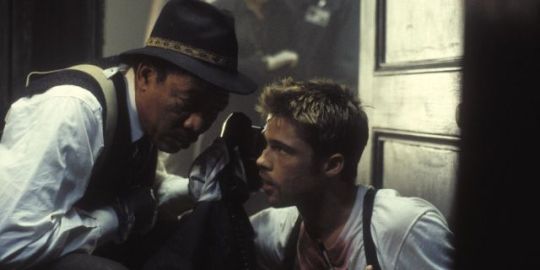
While Loki is unsuccessfully looking for answers in the TVA’s library, there’s a recognizable sound that starts to play in the background. Bach’s “Orchestral Suite No. 3 in D Major” may just be another classical song for some, but for diehard fans of Se7en, it’s a clear reference.
It’s a subtle nod to a similar scene in Se7en when Detectives William Somerset and David Mills are doing their own research in a library. According to Looper, a panel with the stars and producers of the show confirmed this reference. Director Kate Herron herself said, “There’s a little reference to Se7en in Episode 2, a little needle drop which I’m sure fans of that film will recognize instantly.”
8 A Lot Of 90s Drinks

The TVA workers sure love their discontinued drinks, as fans can spot them throughout different episodes in the show. The first drink that makes an appearance is the 1995 PepsiCo energy drink, Josta Cola, which Mobius can be seen sipping in the first episode. Another TVA worker, Casey, enjoys a 1990 fruit juice, BoKu in episode 2, before it’s hilariously ripped away from him by Loki.
RELATED: 10 Things About Lady Loki Only Comic Fans Know
The last drink is not in the hands of a TVA worker, but is instead held by one of the best Loki variants from the MCU and the comics, Kid Loki. The 1989 drink, Hi-C Ecto Cooler, was released after the massive success of Ghostbusters in 1984. Fans who are familiar with the short-lived drink might be able to spot Slimer on the juice box.
7 Soldiers From Aliens

In episode 3, Loki and Sylvie are attempting to board the ark, but have to get through two guards who are checking for tickets. The credits reveal that the guards are named Corporal Hicks and PVT Hudson, which is a nod to the cult classic 1986 sequel, Aliens.
In Aliens, Private Hudson and Corporal Hicks are played by Bill Paxton and Michael Biehn, respectively. While they’re not running away from any aliens in the MCU, they do lose to the wit and cunning of the two Loki variants that work together to get past them.
6 Lady Sif’s Locks

After Mobius locked Loki in a time loop, viewers are greeted by a very angry Lady Sif, who is furious with the protagonist for chopping her hair. This is a story that is directly taken from Norse mythology.
In the tale, Loki casts a spell on Sif which puts her to sleep. While she sleeps, Loki mischievously cuts off her golden locks, which were both her and Thor’s prized possession. This act is definitely something the God of Mischief will have to add to his list of things to make up for, though it’s questionable that any of Loki’s nicest gestures will ever be enough for Lady Sif to forgive him.
5 Oak Island’s Treasure

Back in the TVA in episode 5, a dizzying pan gives viewers a glimpse of the TVA monitor, which mentions “Oak Island, Nova Scotia.” This real-world island located on the south shores of Canada has been shrouded in mystery for years.
RELATED: The 10 Most Powerful Characters In Loki, Ranked
Rumor has it that great treasures are hidden somewhere on the island, and since the 1700s, treasure hunters and thrill-seekers have visited the location hoping to discover its secrets. Its appearance on the Sacred Timeline might be hinting that there is some truth (at least in the MCU) to these rumors, but fans aren’t likely to find out.
4 The Mystery and Lore of Monsters
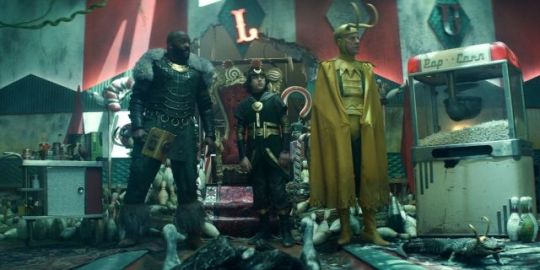
While the Loki variants are drinking Roxxiwine in their hideout in The Void, a pile of books can be seen next to Alligator Loki’s kiddie pool. One title stands out in particular in this scene from episode 5 – The Mystery and Lore of Monsters by C.J.S. Thompson.
Originally published in 1930, the book details the origins of mythological creatures like fairies, dwarves, and giants. Its core message is to explain how monsters are, in fact, a normal part of real-life and society. This is a fitting story for a scene that features the Loki variants that have been excluded from their own timelines and societies.
3 Polybius Arcade Game
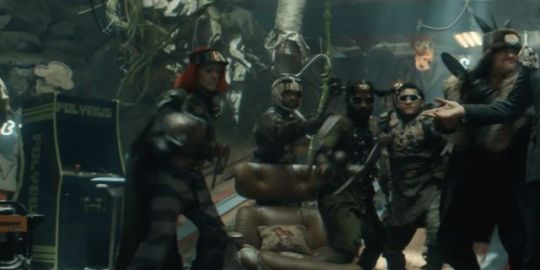
In episode 5, an inconspicuous arcade game can be spotted in the variants’ hideout in The Void. The label reads “Polybius,” which is an urban legend from the early 2000s. The fictitious arcade game is said to have been placed around Oregon during that time, as part of a secret government experiment that went terribly wrong.
Those who tried the game allegedly got quickly addicted to it and experienced hallucinations. Legend has it that men in black would even visit these machines to collect data. It’s not surprising to find this controversial game in The Void, as it likely caused a Nexus event that made it necessary for the TVA to prune it (and possibly the entire bowling alley) from its timeline.
2 The Philadelphia Experiment

As the Loki variants formulate a not-so-brilliant plan to fight Alioth in episode 5, a massive pruned ship appears in The Void. Alioth then annihilates the ship and its crew, which is actually based on a real ship from the Navy.
RELATED: 10 Things About The Time Keepers Only Comic Fans Know
The USS Eldridge was said to be part of the “Philadelphia Experiment” back in 1943. The military experiment was testing a cloaking device and, according to the myth, rendered the ship completely invisible. The fact that it appears briefly in The Void is a testament to just how much work the creators put into referencing and “solving” these popular urban legends.
1 Famous Quotes

During the intro in episode 6, viewers hear some of the most memorable quotes from the MCU that are also interspersed with non-MCU lines. As the camera pans away from earth to the rest of the universe, fans may recognize some of these lines from famous personalities.
These quotes are taken from real-world figures like Greta Thunberg and Neil Armstrong. Some of the more memorable quotes include Armstrong’s “one small step for man” and Maya Angelou’s “I will rise.” Fans are reminded that in the Sacred Timeline, these real-life superheroes exist and play an important part, too.
NEXT: Every Main Character In Loki, Ranked By Likability
0 notes
Text
Capture-Recapture-Mark using DNA genotyping: Challenges and State of the Art
This is one of those topics that I would consider “old but gold”. I recently had to write about it for one of my classes. So I thought sharing the information I compiled with you too :)
One of the most popular techniques when scientists are looking for quantitative (although as we will see, it ends up being semiquantitative or quasi-quantitative due to technical constraints) population studies is Capture-Mark-Recapture which has two main variants: traditional CMR, and Model-Based CMR, commonly used along genotyping. So, I decided to explore further into the later, because I noticed that even though it’s become very common practice among monitoring programs, is still having many shortcomings, so I wanted to understand the source of these and how researchers are coping with them in the recent years.
Genetic Capture-Mark-Recapture (CMR), as said before is now a routine procedure in many programs of wildlife conservation. Some of the most common applications of this technique are: estimates of population size (abundance), sex ratio, survival, migrations patterns, fecundity, population growth and of course the genotypes can be used for paternity tests (Lampa et al., 2015; Lucaks and Burnham., 2005).
The general steps of the method imply processing non-invasively collected samples (e.g. faeces, hair, feathers, saliva, etc.) to extract DNA and genotype it at multiple loci (e.g. microsatellites). This multilocus genotype is then considered a molecular individual mark, just as fingerprints in forensic medicine. After obtaining a number of samples, matching genotypes are considered to belong to the same individual and are classified as recaptures. While non-matching genotypes should indicate newly captured animals, but unfortunately that is not always as straight forward.
So, even nowadays, there are still challenges to overcome when using genotyping-CMR. Genotyping errors can be misleading, causing to erroneously assign a sample to the wrong individual. Also can create “false individuals” by just a single loci being mistyped.
Samples can also be confounded if they contain a mixture of DNA from more than one individual. It can also be an intrinsic bias, as in human forensics some individuals had been identified and termed “shedders” which tend to leave more DNA traces than others (“nonshedders”) (Lucaks and Burnham, 2005).
The problems faced in the genetic analysis itself, of noninvasive samples can arise from very different sources and steps. Some of the most commonly referenced are: amplification failure and allelic dropout (Lukacs and Burnham, 2005). Amplification failure can be caused by a lack of the target sequence (due to degraded DNA) or by PCR inhibitors present in the sample. While allelic dropout, is by definition the loss of one allele during polymerase chain reaction (PCR) amplification of DNA (Steyer, K, et al. 2016).
Challenges in constructing capturing histories from multilocus genotypes may also involve inflated mark-recapture abundance estimates. Additionally, while increasing the number of analyzed loci improves the discriminating power of the test, larger panels also increase the probability of additional genotyping error events (Sethi, et al. 2016).
Possible solutions to overcome genotyping errors
Approaches to deal with genotyping most common sources of error have been proposed, which can be grouped into the following categories: (i) removing genotyping errors from the data, (ii) develop robust genotyping errors sampling protocols, but this is not as straight forward as it seems (Lampa et al., 2015; Sethi, 2016).
There are some tests that can provide useful information about the quality of the genotypes. One of these is the examining-bimodality (EB) test, that searches for an over-abundance of genotypes observed only once. Second one is the Difference in Capture History (DCH) which examines the rate at which new individuals are recognized by looking at more loci (McKelvey and Schwartz, 2004). Although the two tests assume equal capture probability among individuals (which seems to be one of the assumptions that researchers can’t shake off when using CMR).
Since the type of errors mainly depend on the stage of the process we look at, (i.e. sampling, genotyping and in most cases, estimating population size) it makes sense to approach the solutions on the same basis. For instance, when collecting the DNA samples it is very important to chose a sampling design appropriate for the ecology and other details of target species and the assumptions of the selected CMR model (e.g. closed populations, capture probabilities, etc.). As simple as this step may seem, neglecting it would lead to unsuccessful downstream genotyping and population analysis. Other relevant considerations on early stages are the careful sample handling, preservation and extraction methods, given the fact that samples normally contain contaminants, PCR inhibitors and poor quality genetic material (Lampa et al., 2013).
As seen overestimation or underestimation of populations size are very sensitive to even slight genotyping errors. One recommendation is to look for the best balance of the number of typed loci to minimize the probability of identity without increasing too much the genotyping effort and thus, the error window (Lampa et al., 2013; McKelvey and Schwartz, 2004).
There are attempts harnessing bioinformatic tools for simulations and exploring options to select the number of markers, allelic richness and genotyping error rates which are acceptable for efficient CMR histories. They tested error-tolerant likelihood-based match, combining probabilities of latent genotypes and probabilities of observed genotypes, which may contain genotyping errors. Since they compared microsatellite based makers and Single-Nucleotide Polymorphisms (SNPs, which are another option for genotyping not so commonly explored in CMR), they found for instance that SNPs are computationally more efficient during the match calling and sample clustering. They suggest that SNPs may overtake microsatellite approaches in the future (Sethi et al., 2016).
Choosing the best models to fit the data obtained by microsatellite genotyping is also very challenging, given that one must take many assumptions (closed population, equal capture probabilities). The general recommendation is to prefer a model accounting for error. For instance, a recently published paper, combined the non-invasive CMR with Spatially Explicit Capture Recapture approach using wolves feces. They applied a Poisson observation model with a single survey, and the null model M0. To overcome the problem with the assumptions that all individuals are uniformly and independently distributed, they modeled each collection site “centroid” of the cell, as count detectors based on the assumption that the same wolf can be detected at multiple cells during the sampling and more than one individual can be detected in the same detector (López et al., 2018).
Almost all the steps can be analyzed using decision diagrams of assumptions and filling in with the specific features of the study, jus as exemplified by Lampa et al., 2013 and Lampa et al., 2015. A summary of the general workflow as recommended by Lampa et al., 2013 can be found above, although this and other similar setups must only be considered as guidance.
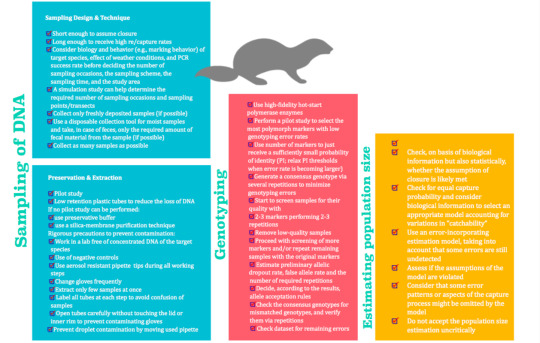
The most recent advances in high-throughput Next Generation Sequencing may help solve some of the genotyping wicked shortcomings by allowing the possibility of sequencing single molecules without previous amplification steps (Lampa, et al., 2013), however I was surprised to found no papers looking specifically into this, so it seems this option still needs to be explored.
In general it seems that is always highly advisable running pilot studies to define the most suitable approach and model prior conducting the actual non-invasive CMR. These pilot studies and good planning overall, can be lifesavers, since it can prevent other sources of bias (inappropriate sample size, wrong type of sample and/or sampling sites, etc.).
As today, although it is very clear that we haven’t reach the point in which genotyped-CMR data can be considered 100 % reliable, as new techniques continue to develop is very likely that in the near future more robust tools will become available.
References
López-Bao JV, Godinho R, Pacheco C, Lema FJ, García E, Llaneza L, Palacios V, Jiménez J (2018), Towards reliable population estimates of wolves by combining spatial capture-recapture models and non-invasive DNA-monitoring. Nature Scientific Reports 8:2177.
Lukacs MP and Burnham PK (2005), Review of capture–recapture methods applicable to noninvasive genetic sampling. Molecular Ecology 14, 3909–3919
Lampa S, Henle K, Klenke R, Hoehn M, Gruber B (2013). How to Overcome Genotyping Errors
in Non-Invasive Genetic Mark-Recapture Population Size Estimation—A Review of Available Methods Illustrated by a Case Study. The Journal of Wildlife Management, DOI: 10.1002/jwmg.604.
Lampa S, Mihoub J-B, Gruber B, Klenke R, Henle K (2015) Non-Invasive Genetic Mark- Recapture as a Means to Study Population Sizes and Marking Behaviour of the Elusive Eurasian Otter (Lutra lutra). PLoS ONE 10(5): e0125684. doi:10.1371/journal.pone.0125684
McKelvey, KS, Schwartz M. K. (2004), Providing Reliable and Accurate Genetic Capture-Mark-Recapture estimates in a cost-effective way. The Journal of Wildlife Management, 68: 453–456. doi 10.2193/0022-541X(2004)068[0453:PRAAGC]2.0.CO;2
Sethi SA, Linden D, Wenburg J, Lewis C, Lemons P, Fuller A, Hare MP (2016) Accurate recapture identification for genetic mark–recapture studies with error-tolerant likelihood-based match calling and sample clustering. R. Soc. open sci. 3: 160457. http://dx.doi.org/10.1098/rsos.160457
Steyer, K., Kraus, R.H.S., Mölich, T. et al. t (2016) Large-scale genetic census of an elusive carnivore, the European wildcat (Felis s. silvestris), Conserv Gene 17: 1183. https://doi.org/10.1007/s10592-016-0853-2
1 note
·
View note
Text
All About My Surgery
So I have been referencing my surgery quite often and felt like I should explain everything there is to say about it (human osteology which is forensic which is academic!).
Starting this from the beginning: All my life I have felt pain in my knees whenever I did any physical activity. I noticed that I was pigeon toed (my feet pointed inward not straight) which eventually provoked bullying but thats not relevant here. This started to prevent me from everything and gym class was tough. I couldn't run or kick a ball and always failed my mile run tests. Then I became aware of the fact I was standing “like a mermaid”. Most people stand toes to north and heel to south. Well for me, I stood feet crossed toes pointing west and east with heels touching. At the doctors, we always expressed concerns but they never did anything about it. Fast forward to last year. I went to a doctor about foot pains and that started this huge chain reaction. He told me I am flat footed but the pain is from my knee. So he sent me to a knee doctor who said my knees were problematic but the root of the issue is my hip. So then I went to a hip doctor who was shocked at how intense the issue was. I was told a normal hip/leg rotation was 45 degrees....in my more severe leg, I had about 80-90 degree rotation. This is caused when the femur bone grows in a twisted position off-setting it within the hip. He suggested, and I quote, “massive surgery” which is called a Femoral Derotational Osteonomy. The surgery consists the following: cutting the femur in half, untwisting the bone, repositioning the two halves, using a plate and 3 screws to hold the two pieces together, drilling a hole in the hip bone to put a two pronged “?” shaped plate through the hole (one prong in one out and the ‘tail’ runs down the femur being the plate stated above), then stitching it up and calling it a day. The recovery was estimated 4-6 weeks as well as “limping”/”babying the leg for around 6 months after the surgery. While in the hospital following my surgery, I was given an epidural to decrease the pain. Side note on that: right before my surgery the previous patient 8y boy who had just finished the same surgery came out screaming and crying “JUST TAKE IT OFF” “I WANT TO GO TO SLEEP PLEASEEE” my surgeon came out right after and saw the horrified look on my face (20 years old) and goes “that wont happen to you...his epidural wont work and he woke up too soon so we couldnt properly manage the pain immediately. i hate when they cry i dont want to hurt anyone” so yea that happened but the kid finally relaxed long enough for the nurses to be able to give him the pain meds and he was perfectly fine after. I spent 3 days in the hospital and went home wheel chair bound because i physically could not put any weight on my leg. Now I had my surgery before Christmas so the fact of having to always be moving was horrifying but I was able to manage. At 1 week post op, I was using a walker instead of the wheel chair to move. At 2-3 weeks post op, I was able to get upstairs and stand long enough to cook for myself as well as ditching the walker for crutches. At 4 weeks post op, I was on one crutch and back on campus for move in and made 3 trips to my car then to my dorm then put my car cross campus in the parking garage and hobbling all the way back. Today at 7 weeks and 2 days (2/8/2018), I am walking with no crutch minimal limping (my sister told me ‘Doesnt even look like you had surgery anymore you are fine’) discussed when to stop the physical therapy and minimal pain in that leg. I still have a decent amount of pain because I over work myself but thats why I am where I am. Personal note: I lost everyone close to me during this surgery which hurt the healing factor. I ended a toxic relationship mid recovery because he couldnt understand why I wanted no part in being sexual and that recovery took priority. My best friend has become a stranger to me over the fact that I am in a bad place mentally right now. My roommates have always been distant. My hedgehog developed WHS and is slowly dying at home while I am on campus asking about him daily. I can post more if anyone has more interest on this operation.
#surgery#recovery#post op#the road so far#femur#hip bone#femoral anteversion#anteversion#derotational osteonomy#femur surgery#hip surgery#physical therapy#storytime
2 notes
·
View notes
Text
[Photos of disabled phones] Comment: Apple needs to publicize its store device security measures to deter robberies
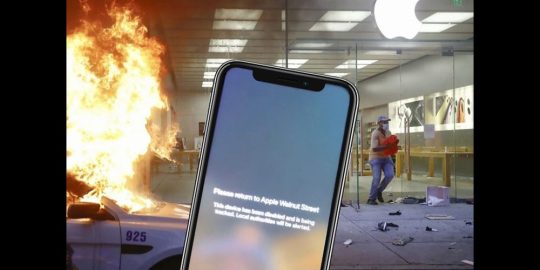

Update: Photos (above) are now surfacing of disabled phones stolen from Apple Stores by looters acting under the cover of protests at the killing of George Floyd.
I’ve seen a couple of pieces recently on what appear to be increasingly frequent snatch-and-grab robberies of display devices from Apple Stores.
One thing stood out for me: neither author appeared aware of the security measures Apple takes to render stolen display devices useless. And if tech writers don’t know about them, it’s guaranteed that thieves don’t either …
For example, CNET referenced three such robberies this month alone.
On Monday, an Apple Store in Costa Mesa, California was robbed by a group of five people who snatched $29,000 worth of merchandise from display tables. Earlier this month, thieves stole over $27,000 in phones and computers in Fresno, California, and more than $19,000 worth of iPhones from the store in Huntington Station, New York.
The display tables in Apple’s stores enable customers to test out its products. But they also make it easy for ill-intentioned people to grab devices and make a quick escape.
Well, that’s true. But the thieves are going to be rather disappointed when they try to sell the devices, because they won’t work. We detailed back in 2016 some of the measures Apple takes to ensure that display devices are useless once removed from the store.
A source tells us that the current special OS images on demo devices include a software ‘kill switch’ which disables them when they go out of range of the store Wi-Fi. This means that Apple no longer has to use Find My iPhone to disable them manually […]
When removed from the Apple Store, a stolen iPhone can’t do anything but ring for Find My iPhone until the battery dies.
iPhones, iPads and Macs alike are all protected in this way. Once the device goes out of range of the store Wi-Fi, it is automatically bricked.
There’s something quite satisfying about the idea of these thieves thinking they’ve just snagged tens of thousands of dollars worth of equipment only to discover that what they actually have is a pile of junk. Or, at best, something they have to break for parts – an expertise they are unlikely to possess. But it would be far better to prevent the thefts in the first place, for two obvious reasons.
First, for anyone present in an Apple Store when one of these robberies takes place, it must be a pretty scary experience. A mob of people whose faces are covered rush in and grab everything they can, presumably not worrying about anyone they have to shove out of the way. Customers won’t know whether they are about to be assaulted, or have their own possessions stolen.
Second, even for those not present in the store, such robberies cause significant disruption. The store may need to be closed for a time while police carry out forensic investigations, and it will take Apple some time to sort out the mess and get replacement display devices up and running. So people may turn up hoping to try out a device, only to be disappointed.
For these reasons, I’d like to see Apple make efforts to publicize the fact that it has these protections in place, and there’s absolutely no point in stealing display devices. That would soon see an end to this type of robbery.
Of course, you could argue that this then tells thieves they need to target stock instead, but stock is much better protected in the case of expensive devices, being kept in a locked backroom. And the reason the snatch thefts are happening is because they allow thieves to be in and out within a minute or two. Trying to gain access to a locked room and load up with boxed devices is going to be a much slower – and therefore riskier – process.
I’m guessing thieves visit the stores beforehand to check the layout and plan their attacks, so a simple notice like this would probably be all the deterrent effect needed:
Display devices are automatically disabled when they leave the store.
I know Apple likes to keep a very laid-back feel, and to have its security as invisible as possible, but this seems to me a simple, non-aggressive measure that would prevent people being traumatized and inconvenienced.
What’s your view? As always, let us know in the comments.
youtube
Photo: AP. This comment piece was originally written in 2018.
FTC: We use income earning auto affiliate links. More.
Check out 9to5Mac on YouTube for more Apple news:
youtube
Source
The post [Photos of disabled phones] Comment: Apple needs to publicize its store device security measures to deter robberies appeared first on abangtech.
from abangtech https://abangtech.com/photos-of-disabled-phones-comment-apple-needs-to-publicize-its-store-device-security-measures-to-deter-robberies/
0 notes
Text
Facts about Covid-19
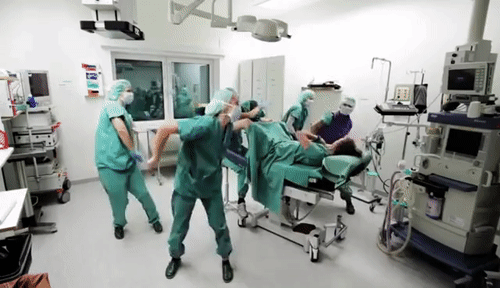
Published: March 14, 2020; Updated: April 7, 2020
Languages: CZ, DE, EN, FR, ES, HBS, HE, HU, IT, NL, NO, PL, PT, RU, SE, SI, SK, TR
Share on: Twitter / Facebook
Fully referenced facts about Covid-19, provided by experts in the field, to help our readers make a realistic risk assessment. (Regular updates below)
“The only means to fight the plague is honesty.” Albert Camus, The Plague (1947)
Overview
According to data from the best-studied countries such as South Korea, Iceland and Germany as well as the cruise ship Diamond Princess, the overall lethality of Covid19 is in the per mille range and thus about ten times lower than initially assumed by the WHO.
A study in Nature Medicine comes to a similar conclusion even for the Chinese city of Wuhan. The initially significantly higher values for Wuhan were obtained because a many people with mild or no symptoms were not recorded.
50% to 80% of test-positive individuals remain symptom-free. Even among the 70 to 79 year old persons about 60% remain symptom-free, many more show only mild symptoms.
The median age of the deceased in most countries (including Italy) is over 80 years and only about 1% of the deceased had no serious previous illnesses. The age and risk profile of deaths thus essentially corresponds to normal mortality.
Many media reports of young and healthy people dying from Covid19 have proven to be false upon closer inspection. Many of these people either did not die from Covid19 or they in fact had serious preconditions (such as undiagnosed leukaemia).
Normal overall mortality in the US is about 8000 people per day, in Germany about 2600 people and in Italy about 1800 people per day. Influenza mortality in the US is up to 80,000, in Germany and Italy up to 25,000, and in Switzerland up to 1500 people per winter.
Strongly increased death rates, as in northern Italy, can be influenced by additional risk factors such as very high air pollution and legionella contamination, as well as a collapse in the care of the elderly and sick due to infections, mass panic and lockdown.
In countries such as Italy and Spain, and to some extent Great Britain and the US, a serious overload of hospitals, notably by the flu, is not unusual. In addition, up to 15% of doctors and nurses currently have to self-quarantine, even if they develop no symptoms.
An important distinction concerns the question of whether people die with or indeed from coronaviruses. Autopsies show that in many cases the previous illnesses were an important or decisive factor, but the official figures usually do not reflect this.
Thus in order to assess the danger of the disease, the key indicator is not the often mentioned number of test-positive persons and deceased, but the number of persons who actually and unexpectedly develop or die of pneumonia.
The often shown exponential curves of “corona cases” are misleading, since the number of tests also increases exponentially. In most countries, the ratio of positive tests to total tests either remains constant between 5% to 15% or increases only very slowly.
Countries without lockdowns and contact bans, such as Japan, South Korea and Sweden, have not experienced a more negative course of events than other countries. This might call into question the effectiveness of such far-reaching measures.
According to leading lung specialists, invasive ventilation of Covid19 patients is often counterproductive and causes additional damage to the lungs. The invasive ventilation of Covid19 patients is partly done out of fear of spreading the virus through aerosols.
Contrary to original assumptions, however, the WHO determined at the end of March that there is no evidence of aerosol dispersal of the virus. A leading German virologist also found no aerosol and no smear infections in a pilot study.
Many clinics in Europe and the US have been lacking patients and some have had to introduce short-time work. Numerous operations and therapies were cancelled by clinics, even emergency patients sometimes stay at home out of fear of the virus.
Several media have been caught trying to dramatize the situation in clinics, sometimes even with manipulative pictures and videos. In general, many media outlets do not question even doubtful official statements and figures.
The virus test kits used internationally are prone to errors. Several studies have shown that even normal corona viruses can give a false positive result. Moreover, the virus test currently in use has not been clinically validated due to time pressure.
Numerous internationally renowned experts from the fields of virology, immunology and epidemiology consider the measures taken to be counterproductive and recommend a rapid natural immunisation of the general population while protecting risk groups.
The number of people suffering from unemployment, psychological problems and domestic violence as a result of the measures taken has exploded in the US and worldwide. Several experts believe that the measures may claim more lives than the virus itself.
NSA whistleblower Edward Snowden warned that the corona crisis is used for the massive and permanent expansion of global surveillance. The renowned virologist Pablo Goldschmidt spoke of a “global media terror” and “totalitarian measures”. Leading British virologist Professor John Oxford spoke of a “media epidemic”.
See also: The Open Letter by Professor Bhakdi to German Chancellor Merkel.
Below you will find fully referenced updates on medical and political developments.
April 7, 2020
The latest figures from a special report by the German Robert Koch Institute show that the so-called positive rate (i.e. the number of test positives per number of tests) is increasing much more slowly than the exponential curves shown by the media and was only around 10% at the end of March, a value that is rather typical for corona viruses. According to the magazine Multipolar, there can therefore be „no question of a dangerously rapid spread of the virus“.
Professor Klaus Püschel, head of forensic medicine in Hamburg, explains about Covid19: „This virus influences our lives in a completely excessive way. This is disproportionate to the danger posed by the virus. And the astronomical economic damage now being caused is not commensurate with the danger posed by the virus. I am convinced that the Corona mortality rate will not even show up as a peak in annual mortality.“ In Hamburg, for example, „not a single person who was not previously ill“ had died of the virus: „All those we have examined so far had cancer, a chronic lung disease, were heavy smokers or severely obese, suffered from diabetes or had a cardiovascular disease. The virus was the last straw that broke the camel’s back, so to speak. „Covid-19 is a fatal disease only in exceptional cases, but in most cases it is a predominantly harmless viral infection.“
In addition, Dr. Püschel explains: „In quite a few cases, we have also found that the current corona infection has nothing whatsoever to do with the fatal outcome because other causes of death are present, for example a brain haemorrhage or a heart attack. Corona in itself is a „not particularly dangerous viral disease“, says the forensic scientist. He pleads for statistics based on concrete examination results. „All speculations about individual deaths that have not been expertly examined only fuel anxiety.“ Contrary to the guidelines of the Robert Koch Institute, Hamburg had recently started to differentiate between deaths „with the“ and „by the“ coronavirus, which led to a decrease in Covid19 deaths.
The German virologist Hendrik Streeck is currently conducting a pilot study to determine the distribution and transmission routes of the Covid19 pathogen. In an interview he explains: „I took a closer look at the cases of 31 of the 40 people who died in the Heinsberg district – and was not very surprised that these people died. One of the deceased was older than 100 years, so even a common cold could have led to death.“ Contrary to original assumptions, Streeck has not been able to prove transmission via door handles and the like (i.e. so-called smear infections).
The first Swiss hospitals have to announce short-time work due to the very low capacity utilization: „The staff in all departments has too little to do and has reduced overtime in a first step. Now short-time work is also being registered. The financial consequences are severe.“ As a reminder, a study by ETH Zurich based on largely unrealistic assumptions predicted the first bottlenecks in Swiss clinics by April 2. So far this has not happened anywhere.
In Switzerland, there was a pronounced wave of influenza at the beginning of 2017. At that time, there were almost 1500 additional deaths in the over 65-year-old population in the first six weeks of the year. Normally, around 1300 people die in Switzerland every year as a result of pneumonia, 95% of whom are over 65 years old. By comparison, a total of 762 deaths with (not caused by) Covid19 are currently reported in Switzerland.
The managing director of a German environmental laboratory suspects that the inhabitants of the northern Italian region of Lombardy are particularly susceptible to viral infections such as Covid19 due to a notoriously high legionella contamination: „If the lungs are weakened by a viral infection, as in the current situation, bacteria have an easy job, can negatively influence the course of the disease and cause complications.“ In Lombardy, regional pneumonia outbreaks had already occurred in the past due to evaporation cooling systems contaminated with legionella.
On the basis of information from China, medical protocols have been defined worldwide that rapidly provide invasive artificial respiration by intubation for test-positive intensive care patients. On the one hand, the protocols assume that a more gentle non-invasive ventilation through a mask is too weak, on the other hand there is the fear that the „dangerous virus“ could otherwise spread through aerosols. As early as March, however, German physicians pointed out that intubation can lead to additional lung damage and has an overall poor chance of success. In the meantime, US physicians have also come forward who describe intubation as „more harm than good“ for patients. Patients often do not suffer from acute lung failure, but rather from a kind of altitude sickness, which is made worse by artificial respiration with increased pressure. In February, South Korean physicians reported that critical Covid19 patients respond well to oxygen therapy without a ventilator. The US physician mentioned above warns that the use of ventilators must be urgently reconsidered in order not to cause additional damage.
The official US Covid19 projections so far have overestimated hospitalisations by a factor of 8, ICU beds needed by a factor of 6.4, and ventilators needed by a factor of 40.5.
Renowned US statistician Nate Silver explains why „coronavirus case counts are meaningless„, unless you know more about the number and way of testing.
Further notes
The website of Dr. Wolfgang Wodarg, one of the earliest and internationally best known critics of the Covid19 panic, was deleted for a few hours today by the German provider Jimdo and only went online again after strong protests. It is not known whether the temporary deletion was due to general complaints or a political instruction.
The university email address of emeritus professor Dr. Sucharit Bhakdi, who wrote an Open Letter to Chancellor Angela Merkel, was deactivated earlier, but was also reactivated after protests.
On April 2, the Danish Parliament adopted a new law that allows the authorities to block „fraudulent“ websites on Covid19 without an initial court order and to impose a higher penalty on the operators. It is still unclear what this means for generally critical websites about Covid19 and government policy in this regard.
The German author and journalist Harald Wiesendanger writes in an article that his profession is completely failing in the current crisis: „How a profession that is supposed to control the powerful as an independent, critical, impartial Fourth Estate can succumb as quickly as lightning to the same collective hysteria as its audience, almost unanimously, and give itself over to court reporting, government propaganda and expert deification: It’s incomprehensible to me, it disgusts me, I’ve had enough of it, I dissociate myself from this unworthy performance with complete shame.
Currently, more than one third of humanity is in a „lockdown“, which is more people than lived during the Second World War.
In the US, applications for unemployment benefits have skyrocketed to over six million (see chart), a figure unparalleled since the Great Depression of 1929.
More than one hundred human rights and civil liberties organizations warn that the world is currently sleepwalking into a surveillance state. On Twitter, the hashtag #covid19 has been partially replaced by the hashtag #covid1984.
US geostrategist Henry Kissinger writes in the Wall Street Journal, „The coronavirus pandemic will forever alter the world order.“ The U.S. must „protect“ its citizens from disease while starting „the urgent work of planning for a new epoch“.
April 5, 2020
In a 40-minute interview, the internationally renowned epidemiology professor Knut Wittkowski from New York explains that the measures taken on Covid19 are all counterproductive. Instead of „social distancing“, school closures, „lock down“, mouth masks, mass tests and vaccinations, life must continue as undisturbed as possible and immunity must be built up in the population as quickly as possible. According to all findings to date, Covid-19 is no more dangerous than previous influenza epidemics. Isolation now would only cause a „second wave“ later.
The British Medical Journal (BMJ) reports that, according to the latest data from China, 78% of new test-positive individuals show no symptoms. An Oxford epidemiologist said that these findings are „very, very important.“ He added that if the results are representative, „then we have to ask, ‘What the hell are we locking down for?’“
Dr. Andreas Sönnichsen, head of the Department of General and Family Medicine at the Medical University of Vienna and chairman of the Network for Evidence-Based Medicine, considers the measures imposed so far to be „insane“. The whole state is being paralysed just to „protect the few it could affect“.
In a world first, the Swedish government has announced that it is going to officially distinguish between deaths „by“ and deaths „with“ the coronavirus, which should lead to a reduction in reported deaths. Meanwhile, for some reason, international pressure on Sweden to abandon its liberal strategy is steadily increasing.
The Hamburg health authority now has test-positive deaths examined by forensic medicine in order to count only „real“ corona deaths. As a result, the number of deaths has already been reduced by up to 50% compared to the official figures of the Robert Koch Institute.
As early as 2018, the German Doctors Journal reported a „multitude of pneumonia cases“ in northern Italy, which worried the authorities. At the time, contaminated drinking water was suspected to be one of the causes.
The German Pharmaceutical Newspaper points out that in the current situation, patients often „fall seriously ill, even die, without having developed respiratory symptoms beforehand“. Neurologists suspect in this regard that the corona viruses could also damage nerve cells. Another explanation, however, would be that these patients, who are often in need of care, die due to the very high stress.
According to the latest figures from Switzerland, the most common symptoms of test-positive patients in hospitals are fever, cough and breathing difficulties, while 43% or about 900 people have pneumonia. Even in these cases, however, it is not a priori clear whether it was caused by the coronavirus or by other pathogens. The median age of the test positive deceased is 83 years, the range reaches up to 101 years.
The British project „In Proportion“ tracks mortality „with“ Covid19 in comparison to influenza mortality and all-cause mortality, which in Great Britain is still in the normal range or below and is currently decreasing.
In the US state of Indiana, calls to the mental health and suicide hotline have increased by over 2000% from 1000 to 25,000 calls per day due to the lockdown and its economic impact.
The medical specialist portal Rxisk points out that various drugs can increase the risk of infection with corona viruses by up to 200% in some cases.
Further notes
The British journalist Peter Hitchens describes in an article entitled „We love Big Brother“ how even previously critical people were „infected by fear“ despite the lack of medical evidence. In an interview, he explains that criticism is „a moral duty“ as fundamental rights are under threat
The German historian René Schlott writes about the „Rendezvous with the police state„: „Buying a book, sitting on a park bench, meeting up with friends – that is now forbidden, is controlled and denounced. The democratic safeguards seem to be blown. Where and how will it end?“
Several German law firms are preparing lawsuits against the measures and regulations that have been issued. A specialist in medical law writes in a press release: „The measures taken by the federal and state governments are blatantly unconstitutional and violate a multitude of basic rights of citizens in Germany to an unprecedented extent. This applies to all corona regulations of the 16 federal states. In particular, these measures are not justified by the Infection Protection Act, which was revised in no time at all just a few days ago. () Because the available figures and statistics show that corona infection is harmless in more than 95% of the population and therefore does not represent a serious danger to the general public.“
The Open Letter from Professor Sucharit Bhakdi to Chancellor Angela Merkel is now available in German, English, French, Spanish, Russian, Turkish, Dutch and Estonian, other languages will follow.
In a new interview, NSA whistleblower Edward Snowden warns that Covid19 is dangerous but temporary, while the destruction of fundamental rights is deadly and permanent.
April 3, 2020
USA: More videos by citizen journalists show that in hospitals described by US media as „war zones“, it is in fact still very quiet.
Austria: In Austria, too, „corona deaths“ are apparently defined „very liberally“, as the media report: „Do you also count as a corona death if you are infected with the virus but die of something else? Yes, say Rudi Anschober and Bernhard Benka, members of the Corona Task Force in the Ministry of Health. „There is a clear rule at present: Died with the corona virus or died from the corona virus both count for the statistics.“ No difference is made as to what the patient actually died of. In other words, a 90-year-old man who dies with a fracture of the femoral neck and becomes infected with corona in the hours prior to his death is also counted as corona death. To name but one example.“
Germany: The German Robert Koch Institute now advises against autopsies of test-positive deceased persons because the risk of droplet infection by aerosols is allegedly too high. In many cases, this means that the real cause of death can no longer be determined.
A specialist in pathology comments on this as follows: „Who might think evil of it! Up to now, it has been a matter of course for pathologists to carry out autopsies with appropriate safety precautions even in the case of infectious diseases such as HIV/AIDS, hepatitis, tuberculosis, PRION diseases, etc. It is quite remarkable that in a disease that is killing thousands of patients all over the world and bringing the economy of entire countries to a virtual standstill, only very few autopsy findings are available (six patients from China). From the point of view of both the epidemic police and the scientific community, there should be a particularly high level of public interest in autopsy findings. However, the opposite is the case. Are you afraid of finding out the true causes of death of the positively tested deceased? Could it be that the numbers of corona deaths would then melt away like snow in the spring sun?“
Italy: Russian experts have noticed „strange deaths“ in nursing homes in Lombardy: „According to newspaper reports, several cases have been registered in the town of Gromo in which alleged corona virus-infected persons simply fell asleep and never woke up again. No real symptoms of the disease had been observed in the deceased until then. () As the director of the nursing home later clarified in an interview with RIA Novosti, it is unclear whether the deceased were actually infected with the coronavirus, because nobody in the home had been tested for it. () In the homes, where medical and nursing teams from Russia are working, corridors, bed rooms and dining rooms are disinfected.“
Similar cases have already been reported from Germany: Nursing patients without symptoms of illness die suddenly in the current exceptional situation and are then considered „corona deaths“. Here again the serious question arises: Who dies from the virus and who dies from the sometimes extreme measures?
Nursing staff: The Süddeutsche Zeitung reports: „Throughout Europe, the pandemic is endangering the care of elderly people at home because nursing staff can no longer visit them – or have left the respective country in a hurry to return home.“
Lastly: Stanford professor of medicine Dr. Jay Bhattacharya gave a half-hour interview in which he questions the „conventional wisdom“ regarding Covid19. The existing measures had been decided on the basis of very uncertain and partly questionable data.
April 2, 2020 (I)
USA
A Swiss biophysicist has visualized the fact that in the US (as in the rest of the world), it is not the number of „infected“ people that is increasing exponentially, but the number of tests. The number of test-positive people in relation to the number of tests remains constant or increases slowly.
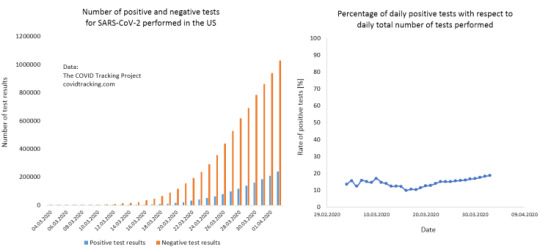
Germany
According to the latest influenza report of the German Robert Koch Institute, the number of acute respiratory diseases has „fallen sharply nationwide“. The values have „dropped in all age groups“.
By March 20, the total number of inpatient cases with acute respiratory diseases had also fallen significantly. In the age group from 80 years and older, the number of cases had almost halved compared to the previous week.
In the 73 hospitals examined, 7% of all cases with respiratory diseases were diagnosed with COVID-19. In the age groups 35-59 years it was 16% and in the age group 60-79 years it was 13% who received a COVID-19 diagnosis.
These figures correspond to those from other countries as well as to the typical prevalence of coronaviruses (5 to 15%).
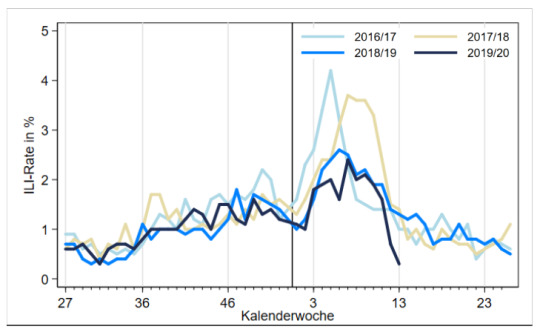
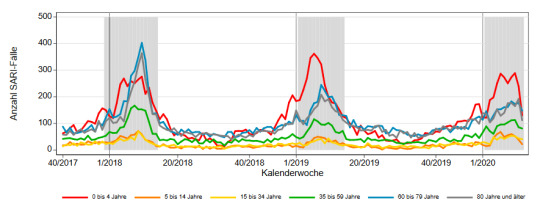
Flu-like diseases in general (top) and acute respiratory diseases in hospitals (bottom) (Robert-Koch-Institut, weeks 13 and 12)
An article in DIE ZEIT discusses the issue of intensive care patients in Germany:
„At present politicians, experts and many citizens observe with concern the exponentially increasing number of people who are newly infected every day. However, this is not the decisive indicator for assessing how badly the corona crisis is and will hit Germany. For it is distorted above all by the number of tests, which have been increasing for weeks.
In order to measure the burden on the health system, the number of those who are so seriously ill that they need to be ventilated is particularly important. As long as there are enough ventilation places for them, a great many of them can be saved. Only when these beds become scarce does a situation like the one in Italy threaten.
The DIVI register now shows that the situation in the German intensive care units has been relaxed so far. „We are still in a comfortable area,“ says Grabenhenrich. The number of seriously ill patients is not rising as steeply as the number of infected patients and even if it did, it would still be possible to provide a large number of intensive care beds with very good equipment.
Switzerland
The Swiss Federal Office of Public Health reports that approximately 139,330 Covid19 tests have been carried out so far, of which the result was positive in 15% of cases. This number also corresponds to the typical corona virus value known from other countries and, as far as can be seen, does not seem to be increasing rapidly in Switzerland either.
Only the number of tests often mentioned in the media is increasing exponentially, but not the number of „infected“, sick or even dead.
On March 31, however, a new weekly mortality statistic was published which for the first time forecasts an increase in overall mortality in the 65+ age group in Switzerland for the 12th calendar week (until 22 March) (see chart below). Specifically, total mortality is expected to increase by around 200 deaths per week.
According to the Federal Office, this increase is „an expression of the current pandemic“. The following problem arises here: up to 22 March there were a total of 106 test-positive deaths in Switzerland. An increase of 200 deaths per week would mean that a large part of the additional mortality is not caused by the virus but by the „countermeasures“.
Another explanation would be that the approximately 200 test-positive deaths of the following week (week 13) have already been included. This would mean that all test-positive deaths are assumed to be additional deaths. However, in view of the age and disease profile as well as international experience, this would be a very doubtful assumption.
In fact, the report adds the following disclaimer: „These initial estimates are still very uncertain, so that no exact figures can be published“.
If it turns out that a large proportion of test-positive deaths (median age: 83 years) are not additional deaths, either the overall mortality would not be increased, or it would be increased mainly because of the drastic measures, as some experts fear.

Weekly mortality until 22 March 2020 (BFS, data status 31 March 2020)
A Swiss newspaper has presented the current total mortality in comparison with previous years (see graph below). This illustrates that, even if actually increased, the current mortality rate is still below the stronger flu winters of recent years.

Weekly mortality during the year. End date is March 22, not March 31 (TA)
Further information
Virus test kits destined for Great Britain had to be recalled because they already contained corona virus components.
The British Imperial College study, which predicted hundreds of thousands of additional deaths but was never published in a journal or reviewed, was based on largely unrealistic assumptions, as has now been shown.
The BBC asks, „Is coronavirus causing the deaths?„, and replies, „It could be the major cause, a contributory factor or simply present when they are dying of something else.“ For example, an 18-year-old man was reported as the „youngest Corona victim“ after a positive test the day before his death. However, the hospital later reported that the young man had died of a serious pre-existing condition.
The European health authority ECDC has published very strict guidelines for handling test-positive or „presumed test-positive“ corpses. In view of the very low mortality rates to date, such guidelines appear questionable from a medical point of view; however, they significantly increase the burden on the health and funeral services, and at the same time have a high media impact.
A German state media outlet has published a critical commentary on Professor Sucharit Bhakdi’s Open Letter to Chancellor Merkel.
The ARTE documentary „Profiteers of Fear“ from 2009 shows how the mainly privately financed WHO „upgraded“ a mild wave of influenza (the so-called „swine flu“) to a global pandemic so that vaccines worth several billion dollars could be sold to governments around the world. Some of the protagonists of that time are again prominently represented in the current situation.
The former judge at the British Supreme Court, Jonathan Sumption, declared in a BBC interview on the British measures: „This is what a police state is like“.
April 2, 2020 (II)
Already in 2018, the Guardian wrote that „Pollution and flu bring steep rise in lung-related illnesses„: Shortage of specialists adds to worries that surge in respiratory diseases is putting pressure on A&Es.
Professor Martin Haditsch, specialist in microbiology, virology and infection epidemiology, sharply criticises the Covid19 measures. These are „completely unfounded“ and would „trample on sound judgment and ethical principles“.
Even representatives of German nursing homes are now complaining about the restrictive measures and inappropriate media coverage of Covid19: „Even before the coronavirus in the winter months, it often happened that many guests died in a relatively short time, but the television crew did not stand behind the door and did not show people in protective suits heroically exposing themselves to the risk of infection.“
Figures from the northern Italian city of Treviso (near Venice) show that, despite 108 test-positive deaths by the end of March, overall mortality in municipal hospitals remained roughly the same as in previous years. This is a further indication that the temporarily increased mortality in some places is more likely to be due to external factors such as panic and collapse than due to the coronavirus alone.
Professor John Oxford of Queen Mary University London, one of the world’s leading virologists and influenza specialists, comes to the following conclusion regarding Covid19: „Personally, I would say the best advice is to spend less time watching TV news which is sensational and not very good. Personally, I view this Covid outbreak as akin to a bad winter influenza epidemic. In this case we have had 8000 deaths this last year in the ‘at risk’ groups viz over 65% people with heart disease etc. I do not feel this current Covid will exceed this number. We are suffering from a media epidemic!“
April 1, 2020
On the situation in Italy
Italian doctors reported that they had already observed severe cases of pneumonia in northern Italy at the end of last year. However, genetic analyses now show that the Covid19 virus only appeared in Italy in January of this year. „The severe pneumonia diagnosed in Italy in November and December must therefore be due to a different pathogen,“ a virologist noted. This once again raises the question what role the Covid19 virus, or other factors, actually play in the Italian situation.
On March 30, we mentioned the list of Italian doctors who died „during the Corona crisis“, many of whom were up to 90 years old and didn’t actively participate in the crisis at all. Today, all years of birth on the list have been removed (see however the last archive version). A strange procedure.
We have also received the following message from an observer in Italy, who gives further details about the dramatic situation there, which is obviously due to far more than a virus:
„In recent weeks, most of the Eastern European nurses who worked 24 hours a day, 7 days a week supporting people in need of care in Italy have left the country in a hurry. This is not least because of the panic-mongering and the curfews and border closures threatened by the „emergency governments“. As a result, old people in need of care and disabled people, some without relatives, were left helpless by their carers.
Many of these abandoned people then ended up after a few days in the hospitals, which had been permanently overloaded for years, because they were dehydrated, among other things. Unfortunately, the hospitals lacked the personnel who had to look after the children locked up in their apartments because schools and kindergartens had been closed. This then led to the complete collapse of the care for the disabled and the elderly, especially in those areas where even harder „measures“ were ordered, and to chaotic conditions.
The nursing emergency, which was caused by the panic, temporarily led to many deaths among those in need of care and increasingly among younger patients in the hospitals. These fatalities then served to cause even more panic among those in charge and the media, who reported, for example, „another 475 fatalities“, „The dead are being removed from hospitals by the army“, accompanied by pictures of coffins and army trucks lined up.
However, this was the result of the funeral directors‘ fear of the „killer virus“, who therefore refused their services. Moreover, on the one hand there were too many deaths at once and on the other hand the government passed a law that the corpses carrying the coronavirus had to be cremated. In Catholic Italy, few cremations had been carried out in the past. Therefore there were only a few small crematoria, which very quickly reached their limits. Therefore the deceased had to be laid out in different churches.
In principle, this development is the same in all countries. However, the quality of the health system has a considerable influence on the effects. Therefore, there are fewer problems in Germany, Austria or Switzerland than in Italy, Spain or the USA. However, as can be seen in the official figures, there is no significant increase in the mortality rate. Just a small mountain that came from this tragedy.“
Hospital situation in the US, Germany and Switzerland
The US television station CBS was caught using footage from an Italian intensive care unit in a piece on the current situation in New York. In fact, dozens of recordings by citizen journalists show that it is currently very quiet in the hospitals on the US East and West Coast, described as „war zones“ by the media. Even the „corpse refrigerator trucks“ prominently shown in the media are unused and empty. (Note: Some of these authors may draw unverified conclusions.)
Contrary to media reports, the register of German intensive care units also shows no increased occupancy. An employee of a Munich clinic explained that they had been „waiting for weeks for the wave to hit“, but that there was „no increase in patient numbers“. He said that the politicians‘ statements did not correspond with their own experience, and that the „myth of the killer virus“ could „not be confirmed“.
Also in Swiss clinics, no increased occupancy has been observed so far. A visitor to the cantonal hospital in Lucerne reports that there is „less activity than in normal times“. Entire floors have been closed for Covid19, but staff „are still waiting for patients“. The hospitals in Bern, Basel, Zug and Zurich have also been „cleaned out“. Even in Ticino, the intensive care units are not working to capacity, but patients are now being transferred to the German-Swiss departments. From a purely medical point of view, this makes little sense.
Other medical notes
The director of the University Medical Center Hamburg, Dr. Ansgar Lohse, demands a quick end to curfews and contact bans. He argues that more people should be infected with corona. Kitas and schools should be reopened as soon as possible so that children and their parents can become immune through infection with the corona virus. The continuation of the strict measures would lead to an economic crisis, which would also cost lives, said the physician.
In Spain, 15% of test-positives are doctors and nurses. Although many of them show no symptoms, they have to go into quarantine, causing the Spanish healthcare system to collapse.
Dr. John Lee, professor emeritus of pathology, is writing about the highly misleading definition and communication of „corona deaths“ in the British Spectator.
The latest data from Norway, evaluated by a PhD in environmental toxicology, again show that the rate of test-positives does not increase – as would be expected in the case of an epidemic – but fluctuates in the normal range for coronaviruses between 2 and 10%. The average age of the test-positive deceased is 84 years, the causes of death are not publicly reported, and there is no excess mortality.
Sweden, which has so far managed without radical measures and has not reported increased mortality (similar to Asian countries such as Japan or South Korea), is remarkably put under pressure from the international media to change its strategy.
Data from New York State show that the hospitalization rate of test-positive individuals could be more than twenty times lower than originally assumed.
An article on the specialist portal DocCheck deals with the problem of ventilating test-positive patients. In test-positive patients, simple ventilation through a mask is officially advised against, among other things to prevent the coronavirus from spreading through aerosols. Therefore, test positive intensive care patients are often intubated directly. However, intubation has poor chances of success and often leads to additional damage to the lungs (so-called ventilator-induced lung damage). As with medication, the question arises as to whether a more gentle treatment of patients would not be medically more sensible.
Reports on political developments
A German state minister has called on the population to „be vigilant and report violations of the rules for containing the corona epidemic to the police“. „Eagerly reported“ are, for example, „prohibited group formation, children in playgrounds, parties“ and hikers.
German constitutional law experts are raising the alarm for „serious encroachments on fundamental rights“. Constitutional law expert Hans Michael Heinig warns that the „democratic constitutional state could turn into a fascist-hysterical hygiene state in no time“. Professor Christoph Möllers of Berlin’s Humboldt University explains that the infection protection law „cannot serve as a basis for such far-reaching restrictions of citizens‘ rights of freedom“. According to the former president of the German Federal Constitutional Court, Hans Jürgen Papier, „emergency measures do not justify the suspension of civil liberties in favour of an authoritarian and surveillance state“.
Online petitions have been launched in several countries to end curfews and other encroachments on basic rights. At the same time, critical video contributions, even by doctors, are increasingly being deleted. In Berlin, a registered event on fundamental rights, at which the German constitution was distributed, was terminated by the police.
March 31, 2020 (I)
Dr. Richard Capek and other researchers have already shown that the number of test-positive individuals in relation to the number of tests performed remains constant in all countries studied so far, which speaks against an exponential spread of the virus and merely indicates an exponential increase in the number of tests.
Depending on the country, the proportion of test-positive individuals is between 5 and 15%, which corresponds to the usual spread of corona viruses. Interestingly, these constant numerical values are not actively communicated (or even removed) by authorities and the media. Instead, exponential but irrelevant and misleading curves are shown without context.
Such behavior, of course, does not correspond to professional medical standards, as a look at the traditional influenza report of the German Robert Koch Institute makes clear (p. 30, see chart below). Here, in addition to the number of detections (right), the number of samples (left, grey bars) and the positive rate (left, blue curve) are shown.
This immediately shows that during a flu season the positive rate rises from 0 to 10% to up to 80% of the samples and drops back to the normal value after a few weeks. In comparison, Covid19 tests show a constant positive rate in the normal range (see below).
Read more here
0 notes
Text
The killing of Rhonda Hinson Part 46

Rhonda Hinson’s Datsun as it was discovered on the morning of her death on Dec. 23, 1981.
Editor’s note: This is a continuation of a series about the Dec. 23, 1981, unsolved murder of Rhonda Hinson.
By LARRY J. GRIFFIN
Special Investigative Reporter
For The Record
With the recent case of Baby Michael solved using forensic genealogy and all the publicity—maybe this could be an option for the DNA found under the arms [of Rhonda Hinson’s sweater].—Comment offered by a respondent to the Remembering Rhonda Hinson Facebook page.
In 1984—approximately three-years after the killing of Ronda Hinson—Alec Jeffreys and his associates at the University of Leicester in England discovered that each person’s DNA varies, rendering every individual on the planet unique. Moreover, they found that specific areas of the long human DNA molecule exhibit a characteristic that they labeled as polymorphism—meaning that the molecule can assume many different forms.
Subsequent to that revelation, Jeffreys developed an efficacious process by which these areas of human DNA could be both identified and analyzed—a procedure that he named DNA fingerprinting or, as it is most commonly known, DNA typing. It was also during the same year that DNA typing was utilized to implicate Colin Pitchfork in the brutal rape and murder of two teenage girls in the rural English hamlet of Narborough. A DNA match was confirmed, eliciting a confession from Pitchfork. It was, incidentally, the first time in which mass DA screening was used to solve a crime.
Prior to this advancement, the only failsafe method for making positive identification of suspected perpetrators was fingerprinting. To date, it remains an extremely powerful forensic tool, with this caveat—fingerprints are not always found at a crime scene because criminals have discovered gloves and the necessity of wiping prints from objects touched during the commission of crimes.
As previously reported in an earlier installment, fingerprints were found on the driver’s side window of the 1981 Datsun 210 on the day of the killing of Rhonda Hinson—Wednesday, Dec. 23, 1981. According to an SBI document detailing the nascent investigation:
“One (1) area of fingerprints was noted on the window and (2) lifts were made from this area. The rest of the door on the driver’s side was fingerprinted without results. The door on the passenger’s side was not fingerprinted, as it had been exposed to the weather on the outside and had been locked at the original crime scene.
However, in a report written by Detective Gene Franklin on Feb. 10, 1995—over 13-years subsequent to the murder—he noted that a substantial amount of evidence had been lost or destroyed, among which were the negatives of the crime scene photos and the, “...fingerprints taken from the door and windows ….”
“We were given a couple of explanations by law enforcement as to what happened to the fingerprints,” Judy Hinson explained in a recent follow-up interview. “One was that a person at the SBI Lab in Swannanoa was responsible for corrupting the fingerprints. We were told that he had attempted to enlarge the prints and messed them up during the process. So, we contacted this man in Swannanoa to ask what happened. He told us that the story we were told was not accurate, that he did not mess-up the prints, and that he would be willing to come to Burke County to quickly straighten things out.”
There is no indication that the fingerprints-of-interest lifted from Rhonda Hinson’s Datsun were ever matched to any individual/individuals present at the crime scene the early morning of Dec. 23, 1981.
Even though his/her fingerprints may be absent or may have been assiduously wiped clean, it is still virtually impossible for even the most fastidious perpetrator to remove every biological indication of her/his presence from the site of a crime. DNA fingerprinting provides an investigator or criminologist with an effective tool for utilizing the most infinitesimal amount of genetic material to identify those individuals who were at the scene of a crime.
DNA can be found in almost every cell in the human body—skin, hair follicles, semen, saliva, and blood are frequent sources of DNA collected at a crime scene. But DNA can be left behind by simply touching something or someone at the site. Touch DNA, as it is commonly known, can provide a complete profile of the perpetrator by using just a single skin cell from her/his finger pads.
It was during the John McDevitt administration, in 2007, that Captain Becky Weatherman of the Burke County Sheriff’s Department and SBI Special Agent Marc Sharpe submitted Rhonda Hinson’s sweater to the SBI Lab to ascertain the presence of DNA on the fabric. The test results indicated that DNA—not belonging to the descendant—was found in both armpit areas, likely the “signature” of the person who removed her from her automobile. Suddenly, “new life was breathed” into what had become a moribund, stagnant 26-year-old investigation.
But the question remained, whose DNA was it—the shooter who, for whatever rhyme and reason, pulled Rhonda from the driver’s seat of the Datsun before fleeing the crime scene or one of the young men who discovered her Datsun backed into a ditch on the west side of Eldred Street and, according to witnesses passing by the crime scene, removed her from the vehicle?
According to a Friday Dec. 23, 2011, article about the discovery of the sweater DNA, written by Matthew Hensley for the Morganton News Herald, a DNA profile was obtained and logged into state and national DNA databases. “…And the sheriff’s office is just waiting for someone to enter a match,” Mr. Hensley reported. “New DNA samples are entered into these databases daily, including samples from every person in North Carolina charged with a felony and many convicts, and Weatherman is hopeful this is how investigators will crack the case.”
The Federal Bureau of Investigation (FBI) oversees DNA databases referred to as Combined DNA Index System (CODIS) and the National DNA Index System (NDIS). These are repositories of DNA fingerprints gleaned from felons and from biological fluids obtained from crime scenes, such as assaults, homicides, and rapes.
Though DNA profiles can be compared through referencing these sources, there does remain a couple of challenges: First, as late as 2019, the databases are still not being systematically used by every state and jurisdiction across the nation. Second, the databanks only contain DNA from those who have been implicated in the commission of crimes. Unless a person-of-interest has a profile previously indexed in the databases, it would be impossible for an investigator to obtain a match for a DNA sample extracted from a crime scene.
Unquestionably, there are instances in which the evidence uncovered during an investigation points to a specific suspect who has never been involved with the jurisprudence system; therefore his/her personal data would not appear in anyone’s records. However, investigators have avenues available to them through which the DNA of a person-of-interest could be collected.
According to sources, it is legal for law enforcement to request that a person submit a sample of her/his DNA. In doing so, it is incumbent upon the officer to inform him/her that it is voluntary and carries with it no legal obligation to provide one—in accordance with the provisions of the Fourth Amendment of the Constitution.
Another option is to obtain a probable cause warrant compelling a person to provide a DNA sample. Probable cause can be established if an investigator has reason to believe that an individual is somehow connected to a crime or crime scene. In many cases, strong circumstantial or indirect evidence has provided ample justification for the successful attainment of a probable cause warrant.
When asked if they believe that enough substantive circumstantial evidence exists to merit a probable cause warrant to collect DNA samples from any person-of-interest connected to the case, Ms. Hinson replied simply yet emphatically, “Yes we do!”
Additionally, if evidence is deemed insufficient to obtain a probable cause warrant, law enforcement has the option of resorting to familial DNA testing—asking a family member of a person-of-interest to submit a DNA sample. Humans share much of the same DNA; however, the minor variations, which differentiate individuals, can express themselves across close family members.
According to Dr. D.P. Lyle, in his book, Forensic for Dummies, brothers, sisters, parents, and children share more DNA than nonrelated individuals. While the DNA of relatives is not similar enough for true DNA matching, it is close enough to suggest a connection and to provide ample bases for obtaining a probable cause warrant.
“To our knowledge,” Judy Hinson averred, “there has only been one attempt to match DNA gleaned from Rhonda’s sweater to anyone. We were told by Marc Sharpe [SBI] that after Bryan Lowman died, his wife gave Marc her husband’s toothbrush to use to get a DNA sample and make a possible match.” Judy said that they never heard back from anyone about the outcome of any attempted match, and can only assume that nothing of consequence resulted.
[NOTE: Mr. Lowman had been a person-of-interest to investigators, at one juncture, but was never connected to the killing of Rhonda Hinson, despite some rumors to the contrary. Marc Sharpe was contacted earlier relative to discussing the Hinson case with this writer—especially the efficacy of polygraph testing—but said he preferred not to comment, even though he is no longer actively connected to the investigation.]
As of this installment and according to the extant information available, there is no indication that any sustained effort has been made to actively seek and obtain—through request or warrant—DNA samples from the principals connected to the investigation into the killing of Rhonda Hinson. Rather it appears that the Burke County Sheriff’s Department continues to wait for someone to enter a match in the state and national DNA databases against which they can compare the DNA profile of the sample lifted from the sweater of the 19-year-old who has been dead for over 38-years.
Upon reading last week’s installment of The Killing of Rhonda Hinson, a number of respondents expressed dismay at having to wait a week to learn the identity of the person whose DNA was recovered from Rhonda Hinson’s sweater. One frustrated reader wrote, “I hate waiting another week, left hanging in mid air [Sic] stranded. I wish these articles were not left hanging…just like a movie that does not complete the scene…you are left waiting until a sequel is written and movie made….” A couple other respondents offered similar observations.
Understandably, it is disconcerting and exasperating to be “left hanging” with no answers visible upon the immediate horizon. However, one equally frustrated friend and follower of the Remembering Rhonda Hinson Facebook page proffered a different perspective in response to the former complaint:
Imagine waiting each week for 38 years. Left hanging with no answers. We are only getting a glimpse of what the Hinsons have been through! And Rhonda was THEIR daughter.
So whose DNA was collected from the blood-soaked sweater of Rhonda Annette Hinson? That is—and has been—a question best addressed to the Burke County Sheriff’s Department.
0 notes
Text
Down the TBR Hole // To Read Soon – Part 1/4

Two more shelves and then I am finally done!
Now for those of you who don’t know, I’ve been doing the Down the TBR Hole posts as a way to organise my Goodreads shelves because oh boy, do they need it!
This has been a long road, much longer than I anticipated!
I wish that this being the second to last shelf means that I’m very close to being done but alas, no, it is not.

These two shelves are my biggest yet and come in at a total of 339 books! So in order to ensure that these posts aren’t incredibly long, I’ll be breaking them up a bit.
For my first To Read Soon Shelf post, I’ll be going through all the books I added from October 2015 to October 2016, which will make it 40 books total.
For my second post, I’ll be going through November 2016 to April 2017, totalling 51 books for that post.
For my third post, I’ll be going through May 2017 to October 2017, totalling 50 books.
For my final To Read Soon Shelf post, I’ll be going through November 2017 onward. totalling 55 books!
That brings this shelf’s total to 197 books!
When I set up these shelves it was my way of trying to prioritize my TBR but I don’t think it’s really worked at all. So while I’m going through these last shelves I’ll be moving the books I choose to keep to the normal Want to Read Shelf.
Before I had kept all my owned books on this shelf but I’ve moved them to a new TBR-Owned shelf.
I hope this new system is going to help me a lot more!
Now, this time around I’m going to try and be my most ruthless in purging these books because 339 books is ridiculous and I know I’m never gonna get around to all of them!
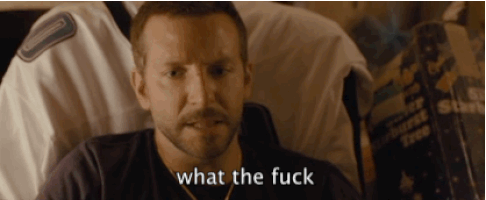






Added October 2015
1.│Winter Girls│Laurie Halse Anderson│

│
I added this because…I was interested in reading a book about anorexia at the time.
Stay or Go? Go! As much there’s still a part of me that wants to read this, I know I shouldn’t for my own mental health as someone who has dealt with disordered eating in the past. That is a slippery slope I should try and avoid.

Added January 2016
2.│Firsts│Laurie Elizabeth Flynn│
I added this because…This book seems like it asks a lot of questions that may or may not be possible to answer. At least not easily. It’s a book that seems to live in the grey and guys…That’s my shit! Also, this sounds like the book version of Easy A and I loved that movie!
Stay or Go? Stay!
3.│The Memory of Light│Added Jan 2016│

│
I added this because…“Somewhere in me I probably had the strength to not kill myself. But I was tired of looking for strength. Tired of being strong. That’s what I did to make it through… each day, go through the motions of being strong. I put on strong every morning. I’m sick of faking strong.”
Stay or Go? Stay! Believe it or not, as someone who’s battled depression, anxiety and suicidal thoughts, unlike disordered eating, I’m not really triggered by it. Or maybe that’s the wrong wording? Reading about suicide hasn’t ever been something that has made me more susceptible to being suicidal. Only feeling so utterly hopeless because of what is going on in my life does that. Does that make sense? Ooh Boy, we’re getting DEEP to begin with!

4.│The Way I Used to Be│Amber Smith│


│
I added this because…I chose to read books about rape because they’re important when done correctly, and help destigmatize survivors.
Stay or Go? Go! I’ve heard that it might sway into torture porn area and I’m not sure I want to read that.
5.│Heartless│Marissa Meyer│
I added this because…The hype, man.
Stay or Go? Stay! I am intrigued enough to stay on the hype train…Even if I’m I might be the very last one aboard!
6.│Violent Ends│Shaun David Hutchinson│
I added this because…With America’s track record I feel like this is an important book to read and I am still yet to read a book about a school shooting??? I mean how is that possible?
Stay or Go? Stay!
Past Down The TBR Hole


Down the TBR Hole 1.12 // Unreleased – Part 3/4 2019 Month Release Unknown

Down the TBR Hole 1.11 // Unreleased – Part 2/4 2019 Month Release Known

Added August 2016
7.│Talking As Fast As I Can│Lauren Graham│
I added this because…Gilmore Girls was my favourite TV show for years and I need the inside goss. Also, I am currently the closest I have ever been to living the Gilmore Girls life with just me and my mum living together! I’d watch it with my mum but she can’t fucking stand Emily.
Stay or Go? Moved to my new Memoir Shelf.
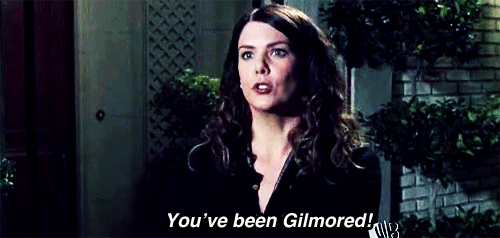
8.│The Help│Kathryn Stockett│

│
I added this because…I watched the film and was interested in what the book was like.
Stay or Go? Go! Plays a bit into the white saviour trope.
9.│The Boy in the Striped Pyjamas│John Boyne│

│
I added this because…I remember watching the film for this in school…Anyway, I was interested in reading the book.
Stay or Go? Go! I think I’m good with having just watched the film. Don’t come after me with pitchforks thanks.
10.│Code Name Verity│Code Name Verity #1│
I added this because…Is it spies?? Is it spies?? I’m going with spies. Is it spies?? Imagine if it’s spies! (If you’re wondering what the hell I am badly referencing its this video)
Stay or Go? Stay!

11.│Chains│Seeds of America #1│

│
I added this because…I am interested in reading a book about slavery.
Stay or Go? Go! I feel like starting with one written by a white woman probably isn’t the wisest choice I could make.
12.│The Butterfly Garden│The Collector #1│

│
I added this because…“I was good at escaping people, not manipulating them.”
Stay or Go? Stay!
13.│Smoke Gets in Your Eyes│Caitlin Doughty│
I added this because…I added this while I was reading a lot of memoirs and this looked really interesting. I love a dark sense of humour.
Stay or Go? Moved to my new Memoir Shelf.
14.│Stalking Jack the Ripper│Kerri Maniscalo│
I added this because…Murder. History. Dead bodies. Forensic Medicine. This is everything 14-year-old Grey would have loved and 25-year-old Grey still loves.
Stay or Go? Stay!
15.│It Ends with Us│Colleen Hoover│

│
I added this because…I am yet to read a Colleen Hoover book and this seemed like a good a start as any?
Stay or Go? Stay! This still seems like the best place to start.
16.│Girl in Pieces│Kathleen Glasgow│


│
I added this because…I saw that is was for fans of Girl, Interrupted and I loved that movie (No, I haven’t read the book leave me alone).
Stay or Go? Go! I don’t think I’ll like the writing style.
17.│Forbidden│Tabitha Suzuma│


│
I added this because…Here’s the thing: I don’t like incest narratives. They make me feel sick. The only reason I got through TMI was that I already knew
spoiler.
they weren’t brother and sister.
(Don’t fight me. I marked the spoiler, and if you didn’t already know there was an incest narrative in that series then how?????)
But so many people have given this 4-5 stars on Goodreads so I thought maybe I should give it a go.
Stay or Go? Go! Yeah, the incest thing is just never gonna be something I wanna read.

Added September 2016
18.│The Queen of Blood│The Queens of Renthia #1│Sarah Beth Durst│
I added this because…This sounds like a better version of Red Queen that also has strong female friendships.
Stay or Go? Stay!
19.│This is Not a Test│This is Not a Test #1│Courtney Summers│

│
I added this because…This sounds creepy and interesting and I’ve liked Summers’ work so far.
Stay or Go? Stay!
20.│The Casquette Girls│The Casquette Girls #1│Alys Arden│
I added this because…I’m always drawn to stories set in New Orleans for some reason.
Stay or Go? Go! The setting is not enough to keep me interested.
21.│Wrecked│Maria Padian│

│
I added this because…As you’ve probably noticed, I’m drawn to books about rape and sexual assault for many reasons, mostly so that I can understand what it’s like to go through something so traumatic, as best as possible, without going through it myself. Which is usually the case for most books representing experiences I’ve never had. With rape and sexual assault books, it’s different though, because as a woman in today’s society I always live with the threat that one day it could be me.
Stay or Go? Stay! I’m yet to read one set on a college campus.
22.│Want│Want #1│Cindy Pon│

│
I added this because…Most people seem to really enjoy it!
Stay or Go? Go! I need to learn to accept that sci-fi isn’t really for me and your stereotypical dystopian is probably not really something I’m going to enjoy.
23.│Saint Death│Marcus Sedgwick│

│
I added this because…It’s a book about immigration rights.
Stay or Go? Stay! Hello? Can you say fucking RELEVANT?

Past Grey Reads


Book Review // Girl Made of Stars – I Am Broken

Book Review // Everything Leads To You – A Quite Love Story

Added October 2016
24.│A Mortal Song│Megan Crewe│

│
I added this because…This sounded interesting enough.
Stay or Go? Go! This one hasn’t held my interest and is hard for me to get a hold of.
25.│The Nightingale│Kristin Hannah│
I added this because…People seem to really love this one and also:
“If I have learned anything in this long life of mine, it is this: in love we find out who we want to be; in war we find out who we are.”
Stay or Go? Stay!
26.│The Blade Itself│The First Law #1│Joe Abercrombie│
I added this because…Listen, sometimes I add things because I see one good review and all of a sudden I’m interested in a book I’d never actually pick up. It’s a problem I’m trying to get under control for my own sake.
Stay or Go? Go! Though I am almost tempted to keep because one reviewer likens a character to Deadpool…
27.│Highly Illogical Behavior│John Corey Whaley│


│
I added this because…This sounds so bloody interesting! I don’t think I’ve read about a character with agoraphobia, and what I’ve seen of them in film, tend to be made fun of.
Stay or Go? Stay!
28.│Wolf by Wolf│Wolf by Wolf #1│Ryan Graudin│
I added this because…This sounds so weird and so good!
Stay or Go? Go! And, I don’t feel any drive to pick this one up.
29.│In the Woods│Dublin Murder Squad #1│
I added this because...Every now and then I’ll add a mystery thriller that I never seem to pick up because I’m always worried they’re gonna be stereotypical trash filled with old and played cliches and offensive tropes.
Stay or Go? Stay! Right now I am all about the mystery thrillers and I seem to be getting better at finding the good shit.

30.│The V Girl│Mya Robarts│

│
I added this because…Everyone I’ve seen read it has loved it and I’ve been recommended it more than once.
Stay or Go? Go! Me and sex slavery don’t really get along. I guess it affects me more than contemporary rape narratives.
31.│Daughter of Smoke & Bone│Daughter of Smoke & Bone #1│Laini Taylor│
I added this because…Two words: Demon’s assistant.
Stay or Go? Stay!
32.│The Nix│Nathan Hill│
I added this because…I. Don’t. Know???? Like honestly have no idea?? None of this screams a Greyson read???
Stay or Go? Go!
33.│My Favourite Manson Girl│Alison Umminger│
I added this because…Umm??? Hello??? It’s about the Manson girls!
Stay or Go? Stay!
34.│The Truth Commission│Susan Juby│
I added this because…I read Emily May’s review and she seemed to really enjoy it.
Stay or Go? Go! I gotta start getting tougher with this purge!
35.│Railhead│Philip Reeve│
I added this because…This sounded interesting enough and Emily May’s review called it a book for the curious and I am definitely that.
Stay or Go? Go! Curiosity isn’t enough to get me to pick this one up.
36.│Homegoing│Yaa Gyasi│

│
I added this because…“What I know now, my son: Evil begets evil. It grows. It transmutes, so that sometimes you cannot see that the evil in the world began as the evil in your own home.” This is a family saga and after the mess my family has been for at least the last year, I feel like this could be very cathartic for me.
Stay or Go? Stay!
37.│Behold the Dreamers│Imbolo Mbue│

│
I added this because…This sounded interesting enough, covering many topics that are quite relevant at the moment.
Stay or Go? Go! It’s not holding my attention.
38.│The Fifth Season│The Broken Earth #1│N.K. Jemisin│

│
I added this because…“—for all those who have to fight for the respect others are given without question.” When a book starts with that kind of dedication then I know it’s a book for me.
Stay or Go? Stay!
39.│The Bird and the Sword│The Bird and the Sword Chronicles #1│Amy Harmon│
I added this because…Basically, everyone that reads this falls a bit in love with it.
Stay or Go? Stay!
40.│Bad Romance│Heather Demetrios│





│★★★★★│
I have read this book since writing this post and it was so good, I totally made the right call.
I added this because…“Something in me is dimming, something that I already know I can’t get back. But you’re worth it. You are. I will tell myself this for several more months. And when I realize you aren’t worth it, it’ll be too late.” I am always looking for good representations of abusive relationships of all kinds and this seems to be one of them.
Stay or Go? Stay! In fact, I just requested it at my library.


October 2016 was a crazy busy adding month!
So how did I do?
Well, I got rid of a whopping 17 books! Kept 21 and moved 2! If I can keep this up then I might be able to cut my TBR by half!
What books are you reading right now?
Have you got any books on your TBR that match mine?
Are there any books you’ve read that I’m keeping or getting rid of?
What did you think of them?
│Blog│Goodreads│Instagram│Twitter│Tumblr│

Advertisements
__ATA.cmd.push(function() { __ATA.initSlot('atatags-26942-5c714855d2c6a', { collapseEmpty: 'before', sectionId: '26942', width: 300, height: 250 }); });
__ATA.cmd.push(function() { __ATA.initSlot('atatags-114160-5c714855d2c6d', { collapseEmpty: 'before', sectionId: '114160', width: 300, height: 250 }); });
from WordPress https://ift.tt/2GEweP7
via IFTTT
0 notes
Text
RUSSIAN ROULETTE: CHAPTER TWO.
chapter 0, chapter 1,
2x02. p911.
Kit and Aleksander hadn't even been on their first case with the team yet and everyone already hated them. With the exception of Jason, Derek, and Spencer.
Jason was willing to give the twins a shot. No matter how much the team may hate them, they were still apart of the team. Nothing would change that.
Derek understood Kit and Aleksander had a rough childhood. Hell, they barely even had a childhood. He couldn't just hate them without even giving them a chance. Derek and Kit had grown quite close, he even got a half smile out of Kit.
Spencer and Kit had just simply grown close. He came to find out that Kit was much more than an emotionless killing machine. Rather, the opposite. Kit spilled a lot of the things she's been through to Spencer, and he didn't know how to take it at first. Then, upon finding out Kit actually cried and could express her emotions, caught on comforted her.
Yet only Derek got even the slightest smile out of her. Spencer began to think that maybe Kit didn't like Spencer, despite the interest she showed in him and his rambling.
"Hey," Kit said softly, placing a hand on Spencer's shoulder gently.
"Uh- hey," Spencer said, looking up at her. He smiled a bit, Kit's eyes seeming to light up slightly, "you know, I've noticed a pattern with you. Everytime someone you've grown to care about smiles, your eyes light up. But you never actually smile."
"I don't smile for a reason," Kit said softly, "I'll explain it later. When we have time. But JJ said there was a case..."
"Right," Spencer nodded, "oh, uh- someone sent this to you."
Kit furrowed her eyebrows. She hadn't made any friends. At all. Who the hell could've been contacting her or sending her stuff like this?
Kit opened the envelope and looked at the pictures. She flipped through them, the threats on each getting worse and worse. What finally phased her, though, was when her brother was mentioned. She threw the photos in the trash immediately.
Aleksander walked up to her, also holding a batch of photos. "Вы их тоже получили?" He asked. (You got them too? Or did you get them too?)
Kit nodded nervously. Spencer looked at them. "я напуган," Kit whispered. (I'm scared.)
Aleksander placed his hands on either side of her face gently, shaking his head. "Don't be," he said. Kit nodded and bit her lip, "let's go."
Kit nodded, beginning to walk away. "It'd a sick prank. Just a sick prank."
"40,000 images of child porn are posted every week on the internet, along with the appearance of twenty new children. The appetite for babies as young as four months old has soared," Spencer said, "many of these children have been kidnapped and sold into pedophile rings."
"One year ago, the same boy appeared on several websites used by pedophiles," Jason said, "he was a new face then. After a massive hunt led by our Crimes Against Children Unit, the boy disappeared."
"Until tonight when SSA Cole telephoned us," Hotch said.
"Katie Cole?" Derek asked. Kit looked at him and raised her eyebrows. Hotch nodded.
"She was in the BAU, right?" Spencer asked.
"One of the first profilers, clinical psychologist, brilliant," Jason said.
"She runs the Crimes Against Children Unit in Maryland," Maribelle said.
"I've always wanted to meet her," Derek said as he sat down.
"Really? I heard she's a bitch," a woman said, walking into the room.
"Nobody ever called you that, Katie," Jason said.
"Well, not to my face," Katie replied. Kit chuckled and looked down. She looked at the screen and sighed, "the first time I ever saw him, he appeared in a series of photos. I named him Peter." She stood there for a moment before walking up to Jason and Hotch, "now he's being auctioned off when that clock runs to zero."
Kit scoffed quietly, looking at Aleksander. "Over my dead body," she said.
"Auctioned," JJ said, shaking her head slightly.
"His face isn't pixilated,"
"'Cause the unsub is confident that we're not going to be able to identify him in time," Hotch said.
"What about the site itself?" JJ asked, "can't we just track it's origin?"
"It's routed through a proxy server in Belarus," Katie replied, "even if that government wad friendly, Peter'd be gone before we finished the paperwork."
"Isn't our grandmother from Belarus?" Kit asked, looking at Aleksander.
"I think so."
"We don't need to worry about the paperwork," JJ said, "we have Garcia."
"Better get on that, will you?" Jason asked.
"Yes, sir," JJ said as she walked away.
"So, what happened a year ago, Katie?" Hotch asked. The question immediately peaked Kit's interest and she sat up.
"We cross-referenced the images of the boy. We talked to known offenders nationwide. We narrowed the location down to the eastern United States. We had some suspects in, but the trail went cold. Until today," Katie said.
"With all due respect, Miss Cole—" Derek started.
"Uh oh," Kit said, biting back a smile.
"Hush. With all due respect, Miss Cole, how is this time going to be any different?" Derek asked.
"We have a starting point," Katie said.
"The location where the image was first discovered," Hotch said.
"A chatroom— hosted by an independent web company in Cleveland, Ohio," Katie said.
"Fun fact, when I was fifteen, I slept with a senior in highschool on a mission in Cleveland," Kit said to Derek. He furrowed his eyebrows and gave her a look, smiling slightly.
"And this time, I'm brining you all in with me," Katie said.
theologian dietrich bonhoeffer said. . .
" the test of the morality of a society is what it does for its children. "
Kit and Spencer were walking, Spencer trying to get Kit to smile every so often. They walked past the elevator and Spencer stopped, Kit doing the same.
"Well, if it isn't Dr. Reid," Elle said. Kit stepped back awkwardly, biting her lip as she glanced around.
"Elle. Wow," Spencer said, walking towards her. Kit stayed put.
Not needed, not wanted. Everything's the same.
"Nice haircut," Elle said.
"Thanks," Spencer said, touching the back of his head, "uh, yeah... I like your haircut, too."
God, he's so awkward...
"Is that a boys' regular?" Elle asked.
"Yeah, it is," Spencer replied, "Wa- do you not like it?"
"It's totally you," Elle chuckled.
"So, you're, uh... Okay?" Spencer asked. Kit raised her eyebrows.
Kit and Aleksander had been in court a few months prior to this case. Really, the only people they got to know were Spencer, Jason, and Derek.
Hotch opened the door and walked out of the bullpen.
"I didn't think you were back till next week," Hotch said. Kit rook a deep breath and sighed.
"Oh, um, I got a text message, so..." Elle said trailing off. Kit sighed before walking away to find Derek.
"Hey, mama," Derek said, Kit turning around and looking at him.
"Hey," she said softly.
"You all right?" Derek asked.
Kit nodded. "Uh— your coworker, Elle, is back... Figured I'd give Spencer and Hotchner some time with her," she said.
"You're allowed to call him Hotch, Kit Kat," Derek said, laughing a bit.
Kit sighed and nodded. "Right," she said softly.
Derek sighed. "What's it gonna take to get you to smile?"
"Maybe some coffee after this case," Kit smirked.
"I'm counting that as a smile," Derek laughed.
Kit rolled her eyes, shrugging. "Whatever floats your boat, горячая штучка," she said. (Hot stuff.)
Derek raised his eyebrows as Kit began to walk away. "Wait, wait, tell me what that means," he said.
"Ask Spencer."
"The image was uploaded to one of our C.AC. undercovers fishing in a chatroom," Katie said, "we try to monitor as many of them as we can, pretending to be children, pedophiles, whatever works on that site."
"Did you run forensic linguistics on the chat log? There might be something to Hugz' speech pattern," Aleksander asked. Kit looked at him and raised an eyebrow, "what? I know things."
"It doesn't really work that way with internet talk." There was turbulence, Kit guessed, which caused Katie to gasp and stumble slightly.
"Fear of flying?" Jason asked. "Lengthy, deep-rooted issues of control?"
"I— think better on my feet," Katie replied.
"Imagine thinking at all," Kit mumbled. Derek looked at her and smiled.
"Come on, girly, use that brain of yours. I know you're smart, you're just stubborn and refuse to show it," he smirked.
Kit scoffed. "I wish."
"Most of the talk is abbreviated text- LOL, laughing out loud. IMHO, in my humble opinion. FTF—"
"Face to face," Derek and Kit said.
Derek gave her a curious look and she smirked. "How do you think I managed to get my targets to meet me?" She asked.
Katie looked at the two and nodded. "Right. Uh, pedophiles can be divided into two categories..."
There was more turbulence, obviously making Katie uneasy. Hotch stood up. "Situational and preferential. Situational offenders rarely seek out children, but they'll take advantage of a situation when presented with it, whereas preferential offenders actively target children by age group, hair color... They'll seek out jobs that give them as much access to children as possible."
"They often trawl around residential neighborhoods, hijacking home wireless systems and communicating with children, often outside the very house the child is in," Katie said.
"Or go to a coffee shop with wireless access to find, locate, and arrange a meeting with a child," Kit said.
"And it's growing. It's growing as fast as the internet," Katie said, "they're getting smarter and smarter, and all the security in the world can't stop them from coming through our doors. Hell, the monsters are already in our homes."
"If he's had this kid for a year, this makes him preferential," Kit noted, biting her lip.
"Definitely," Katie said.
"So then why is he selling him?" Derek asked. There was more turbulence and Kit grabbed Derek's hand.
"Maybe, uh... Maybe he's losing interest," Katie said, "Peter's maybe getting too old, too tall. Preferential offenders are very specific about their preferences."
"And if he can't sell him?" Derek asked. Kit inhaled sharply.
"He isn't just going to let him go," Jason said. Kit closed her eyes and sighed.
"Hotch?" JJ asked.
"Yeah?" Hotch asked.
"Yeah, I was thinking, shouldn't we release Peter's picture to the media?" JJ asked.
"No, no, no," Katie said quickly, "if this unsub thinks that we're onto him, he may make a run for it and dispose of the boy."
Kit made a disgusted face and Derek sighed, giving her hand a small squeeze.
"Shouldn't we assume he does know?" Jason asked.
"As I said, we intercepted the image as a part of an undercover operation. These predators have a fairly closed society," Katie said, "the way they run these sites gives them the expectation of anonymity."
Jason nodded. "Right," he said.
"Have Reid, Elle, and Wang check the live feed," Hotch said, "not just the boy, but everything around him- the room. See if we missed anything."
"Okay."
Kit took a deep breath and looked at Derek. "You all right, Kit Kat?"
"I'm... Fine," she replied, biting her lip. Derek nodded.
"Okay..."
Kit and Derek walked into the building, Kit standing behind Derek slightly. "FBI. We have a warrant to search these premises. Stop what you're doing right now," Derek said, holding up the warrant.
Everyone froze and looked at him. "Can somebody tell us who owns this place?" Kit asked.
A man stood up and cleared his throat. "That'd be me," he said.
"I want access to your chatroom databases," Katie said. The man looked at her nervously.
The man scoffed as everyone was going through the databases. "This is so typical," he said, "you feds just can't help yourselves. You gotta pollute the truest form of free expression ever invented."
Kit pulled her stun gun and pressed it against his neck. "You have two seconds to stop talking," she said. Derek snatched the stun gun quickly.
"Agent Morgan, Agent Egorova, find a chatroom of your choice," Katie said, "your name is Susie you're 12 years old."
"With pleasure," Kit said, her and Derek walking over to the computer.
"What are you doing?" The man asked.
"Fishing," Kit and Katie replied as her and Derek watched the screen, Derek typing on the keyboard.
"You know, I've got rights, and so do my clients," the man said.
"And by clients, you mean pedophiles?" Kit asked, raising her eyebrows.
Derek and Kit found a chatroom.
Hi everyone. My name is SUZY. I'm 12yo. Would anyone like to talk with me:):);) Derek typed quickly.
Kit sighed. Why did kids actually put that on the internet?
The computer began dinging and Kit sighed, biting her lip. "That's the sound of pedophiles looking to hook up with a 12 year old girl named Suzy. You let them run everything through SSL connections from proxy servers in offshore countries," Katie said.
"So they can't be identified?" Derek asked. Katie shook her head.
"Not in 12 and a half hours," she said.
"Hey, I'm just a middleman here, okay?" The man asked, "what can I do?"
"There's a little boy for sale on one of your sites. "What can I do" just isn't good enough," Jason said.
JJ had told them there was another kid being held. Everyone got out of the SUV quickly and ran up to the house, Derek kicking in the door. Everyone ran in.
"FBI!" Hotch yelled.
They walked upstairs and made it to the room where there was heavy metal blasting. They ran into the room and walked around. "It's... Clear," Kit said softly, sighing.
Jason turned the music off and said something to the kid, but Kit was too disoriented to know exactly what it was.
"Safe?" The kid asked, getting up.
Kit had done that before. Pretended to be tied up and in an inescapable situation. To look vulnerable to her target, only to kill him.
The kid walked over to his bed and put on a shirt. "What's your name?" Kit asked.
"Kevin."
"The man who did this to you. Is he still here?" Hotch asked.
"This is my house," Kevin said.
"Graham Rose is the owner of this house," Katie said, "where is he?"
Kevin dropped to his knees to use his computer. "Don't touch that," Kit and Aleksander said quickly.
"Back up."
"Where is he?"
"He's gone," Kevin said.
"What do you mean, gone?" Kit asked, saying it so quickly it sounded like one word.
"He's just gone, okay?"
"Graham Rose is your father?" Jason asked.
"Yeah, sure. You can call him that," Kevin said, standing up, "I just call him a bastard." Kit pursed her lips and looked down.
"I called my dad names too, kid, you're not alone," she said.
"The father's been in jail for the last eight months. In that time, Kevin's been selling the only thing he's got, which is himself," Hotch said.
"Just like a street hustler," Derek said.
"Is that comparing sex workers and drug dealers to a kid?" Kit asked, "if that's the case, don't ever compare me to him again."
"Only now the street is the internet," Katie said.
"And his client base spans the globe," Jason said.
"Well, this kid definitely uploaded Peter's video to the chatroom, 'cause it's still on his computer," Derek said.
"Yeah, but not the live feed," Aleksander pointed out.
"He say how he got ahold of the video?" Kit asked.
"He said it came from one of his clients," Hotch said, "it was a shared file. They'd gone around these chat groups."
"It's possible. Buyers and sellers routine. They trade files because the act in itself is an illegal act, which proves they're not the police," Katie said.
"Let's go see what else we can find out."
"Kid, the boy whose video you've been sending around to all those chatrooms, he's gonna be sold from one pedophile to another," Derek said.
"Boo-hoo," Kevin said.
"Just because you're a minor doesn't mean I won't hit you right here and now," Kit said warningly.
"These are dummy logs. What's the password to get me into the real transcripts of your sessions?" Katie asked.
"You're the FBI. You figure it out," Kevin said. Kit narrowed her eyes at him and started to walk towards the young boy, Aleksander pulling her back immediately, "yeah, that's right. Keep your lap dog under control."
"I know you don't think so, Kevin, but we are trying to help you here," Hotch said.
"Help me? What I do is consensual. No one's getting hurt," Kevin said.
"Come on, Kevin, what's the password? Your birthday?" Katie asked, "your... Favorite band."
"Kevin, this is prostitution," Derek said.
"But I'm a minor. I don't even really know what I'm doing," Kevin said, "plus I never leave this room, so no one, no one ever touches me."
"Anymore," Jason said, "your father's been beating you since you can remember. First it was he was drunk on the weekend, then he was always drunk. You never knew why he was hurting you... Why he was so angry. At night, you'd cry yourself to sleep, hoping someone would come and save you. No one ever came."
"You have the chance to be the one who saves someone, Kevin," Hotch said, "you can be the one who answers him, the one who stops his pain. You can't get to your father, but you can get to the guy who's hurting this boy."
Kevin looked at Katie. "Move," he said. Katie got up and Kevin sat down in front of his computer, "this backs up all my transcripts. The screen name of the guy who sent me the file is mehtevas."
"How long as mehtevas been a client of yours?" Kit asked.
"Like, six months," Kevin said.
"Where is he located?" Katie asked.
"He's a local. He's always asking to meet with me, but I don't do that," Kevin said.
"Does he know where you are?" Aleksander asked.
"Just the city," Kevin said.
"How do you contact him?" Katie asked.
"He contacts me," Kevin said.
"Come on, Kevin. You don't just sit around here waiting for these guys to look you up. That's no way to run a business," Derek said.
"Right now, you're the only person who can help us find Peter," Katie said.
"What do you want me to do?" Kevin asked.
"Ask him for a face to face," Kit said.
"No. No way, I don't do that. I've never been out of this room," Kevin said.
"It'll be fine. He won't lay a finger on you," Kit promised.
"We'll be right there, Kevin, the whole time," Hotch said, "I promise you."
"Won't he be suspicious if I suddenly want to meet with him?" Kevin asked.
"He's a need driven offender, Kevin," Katie said.
"What does that mean?" Kevin asked.
"If you offer to meet with him, he won't be able to resist," Jason said.
Aleksander sighed. "He can't help himself."
The second Kevin walked away, Derek and Kit immediately got out of the SUV. "FBI. Turn around," Derek said.
"I didn't do anything!"
"Derek, take it easy," Kit said, "I hate pedophiles as much as you do, but-"
"We need his cooperation," Katie said, "we just need to ask him a few questions
"Here's a question," Hotch said, "what's the principal of a school doing hooking up with a 14 year old boy?"
Hotch tossed Jason his ID. "Let's go. Put 'em on here."
"I wish you would inform me what exactly I'm being charged with," Rawlings said.
"Anything we could possibly stick to you," Derek said, glancing at Kit.
"I haven't done anything," Rawlings said, pulling his arm away.
"You're an educated man, Mr. Rawlings. You know you're in trouble here," Katie said.
"I believe I just walked outside of my school. Is that a crime now?" Rawlings asked.
"It is when we know you've watched a 14 year old shirtless boy tied to a chair online and got turned on by it," Kit said, putting pressure on the pressure point behind his ear.
"Ah!" Rawling yelled. Derek pulled Kit's arm away, keeping a hand on her wrist.
"You know where he is?" Katie asked, handing Rawlings a picture of Peter.
He sighed. "How could anyone hurt something so..."
"Pure? Innocent? Purity and innocence are the two very things being ripped away from him," Kit said, "that takes a toll on your mental health, even as you grow older. It doesn't just affect you as a kid."
"You sent that image to Kevin," Aleksander said.
"Well, that was wrong of me, I know, but I was so shocked. I wanted to try to save this poor boy. I thought Hugz- Kevin- might know him," Rawlings said, "that's why I sent him the link to the website, see if he knew."
"Please. You were trying to save him?" Derek asked, walking closer to Rawlings. Rawlings backed away.
"Help search his office," Jason said.
Kit gave him a look. "I got this," he said. Kit and Derek walked away.
"What a load of bullshit that is," Kit scoffed, scratching the back if her neck slightly.
"You know, you never told me about the brand on your neck," Derek said.
"What's there to tell? Show's my rank in the Academy. The higher the number the better. It went up to 560 in each age group," Kit said.
"You're is 550," Derek said quietly.
"One of the top ten," Kit said. Derek nodded.
"What about the tattoos?" Derek asked.
"Another time, Derek," Kit said as she looked away, cracking the slightest of smiles.
"Tell us we got something we can nail this son of a bitch on," Derek said.
"Not unless we can break the password on this guy's computer," Spencer said.
"Call Garcia," Kit said. Elle gave her a look.
"Take too long," Elle said.
"Come on, genius. Do something genius-like," Derek said, looking at Spencer.
"If this guy does has child pornography on his computer and we type in the wrong password, it could trigger a virus that wipes out the enitre hard drive," Spencer said.
Elle stood up and looked out the window. "What's he saying out there?"
"He's a preferential pedophile who claims he's trying to save them," Derek said.
"Save them. Save-" Spencer cut himself off and got up, grabbing a piece of paper and a marker. He wrote "Save them" on the paper before flipping it over.
"Mehtevas."
Jason, Katie, Aleksander, and Rawlings walked into the room. Derek picked up a chair and walked closer to the four before putting it down. "Mr. Rawlings. Have a seat," he said.
Elle slid his laptop in front of him. "Your laptop."
Derek's phone rang. "Yeah, it's Morgan. Okay, hold on, Garcia. Hold on." He walked out.
"It's, uh, research. I'm writing a book," Rawlings lied.
Kit and Aleksander rolled their eyes dramatically. "Sit down."
"I swear to you this is all just research!" Rawlings said.
"It's not research. It's 100 years in a federal penitentiary," Katie said.
Rawlings closed his eyes for a moment before looking at Jason. "I'd like to make a deal," he said.
"No deals. All you have is a very, very small amount of good will," Jason said.
"Tell me about Peter," Katie said.
"I was contacted by the man who was holding him. I didn't search for this boy. I didn't go looking for this," Rawlings said.
"Stop trying to cover your ass and give us a name," Kit said.
"Well, I only know the screen name," Rawlings said. Kit rolled her eyes, "it's manchild."
"Did you bid on Peter?" Jason asked.
"How much?" Katie asked.
"8,000 dollars. But it was only in order to save him," Rawlings said.
"You the high bidder?" Kit asked.
"I-I think so, yes," Rawlings said, "I was, anyway. I was supposed to go back online and contact him on his website and get the address."
"So you can inspect the merchandise?" Elle asked.
"Look, this child is being auctioned off, and I am trying to save him," Rawlings said.
"Trying to save him," Katie said, "he'd have given you a code. What is it?"
"Come on. I have a family. I have children of my own. I love children. I would never harm them," Rawlings said.
Kit felt tears flood her eyes.
"He loves you, Kitty," the Director said, "he'd never hurt you."
Part of Kit's training as a spy was to sleep with older, more mature men for missions that might involve it. They were all over the age, and Kit was only fourteen. He said they wouldn't hurt her, that they loved her.
It was a lie. All they did was hurt her. She cried herself to sleep every night. Because of them.
"Bullshit," Kit whispered, "I speak from experience when I say that's just a tactic to get children to trust you, you creep." She let a tear slip, her eyes red.
"In your pursuit to save them, you think you could've avoided having sex with them?" Katie asked.
"Mr. Rawlings. The code," Jason said.
Rawlings took off his glasses and placed a hand over his eyes, sighing as he rubbed his face a little. "Butterfly," he said.
Katie walked over and grabbed the computer, typing something in quickly.
"What happened?" Jason asked. Kit looked at the screen, the chat no longer up. Instead, it was a screen that said "error" on it.
"I don't know. He broke contact," Katie said.
"We got reporters outside of the school. This thing is all over the news," Derek said. Kit sighed and looked at him. Derek's face immediately became worried once he saw the tear stains and red eyes.
"Oh my God, that's why the site went down. He knows," Katie said.
"She's sure about this, right?" Elle asked.
"If Garcia says that tadpole shirt came from a unit in Mount Pleasant, then I gotta believe her," Derek said.
"She better be. Mount Pleasant is 60 miles away and there's only two hours left on the auction clock," Spencer said.
"I don't think anyone has anything stronger than Tylenol here, correct?" Kit asked, "that crying gave me a killer headache."
"Maybe. If the unsub knows we're onto him, he may move that clock up," Elle said.
"Recognize him?" Derek asked the man.
"Can't say that I do," the man replied. Kit sighed softly.
"But you're certain that the shirt came from this unit of the tadpoles, right?" Kit asked nervously. She couldn't let this kid go through what she went through. Not happening.
"It disbanded six months ago," the man told her, "before I took over the congregation."
"Why?" Derek asked.
"I was told there wasn't enough interest," the man said, "only a few boys participated."
"Do you have the records of those who did participate?" Spencer asked.
"How could anyone do this to a child?" The man asked as he looked at the picture.
Elle cleared her throat as she sat down. "We need to find this boy," she said, "the records."
"I'm sorry. I don't think so," the man said, "wait. There may be a photo of the tadpoles."
"This may be what you're looking for," the man said as he walked back into the room. He handed Derek the picture.
"Yeah. That's him, right there," Derek said, pointing him out to Kit, "is there a name? Address? Anything?"
"As I said, there are no records left. The church was run pretty sloppily until I took over," the man said.
"Let me see that," Kit said. Derek handed it to her and she took the backing off of it, revealing the three names on the back, "Charlie. His names Charlie."
Everyone got out of the SUVs and met each other in the road. "The name the school has is Charlie Sparks," Aleksander said.
"No Sparks in any of the phone directories," Jason said.
"Garcia can't even find a Sparks within 100 miles for the last ten years," Derek said.
"Probably not his real name anyway," Katie said.
"The school said he may have moved away," Hotch said.
"Then we start over again."
"We don't have a lot of time left," Elle said.
"Guys, maybe we're looking at this the wrong way," Spencer said.
"What?" Aleksander asked.
"The behavior, it's odd, right? The unsub apparently listed this kid in school and the tadpoles until about a year ago. At that point, he had pictures of him online in a regular looking room. But now he's in a prison like room with no windows, no doors, completely hidden."
"Preferential pedophiles don't change overnight," Katie said.
"So what happened a year ago to make his behavior change so much?" Hotch asked.
"Fear," Kit and Jason said.
"Katie almost caught him," Jason said, "you probably talked to him. The unsub's in your records."
Derek's watch beeped and Kit gasped. "No," she whispered.
"Guys, we just ran out of time."
In a fit of rage, Kit punched the back window causing everyone to panic. "Hey, hey, hey," Derek said, grabbing her wrists, "calm down."
Kit closed her eyes as Derek sighed and looked at her bleeding knuckles. "I never really had a good suspect. I only did some general interviews with child offenders on the east coast," Katie said as she began to call someone.
"One of them was the right guy," Hotch said.
"You okay?" Derek asked quietly. Kit hesitated before nodding.
"Fine," she said softly.
"You're gonna need to clean that up," Derek said.
"Later."
"Amanda, hey. Uh, I need you to pull all of the original files on Peter's case. Uh, somewhere in my office. Try my desk. I need the names of everyone I interviewed."
"Have her call Penelope Garcia at the BAU," Derek told Katie, "she'll be able to tell us if we can cross any off."
"You got it? Thanks." She hung up.
"All right guys, listen up, we might have something," Derek said, "twelve men were interviewed. Eight are back in prison, one is dead. One lives in California and two have the last known addresses within ten minutes of us- a Patrick Forest and a Micheal Earlson."
"Patrick Forest isn't smart enough to put this all together," Katie said.
"What about Earlson?" Kit asked.
"Definitely."
The SUVs got there right as Earlson was about to leave. He was surrounded and everyone got out of the SUVs, guns pulled as he tried to run. Derek grabbed him and threw him against the car.
"Where are you going?!" Derek asked, "who's up now, punk?! Don't move!"
Derek cuffed him and put him in the back of the car. Kit sighed as she messed with her knife. "You okay?"
"You've asked me that three times today," Kit pointed out, "you care. A lot."
"Of course I do," Derek said, "now answer the question."
"I'm fine," Kit said, "I bit shaken up... If we were just another minute late-"
"But we weren't," Derek said. Kit nodded and sighed.
"You're right," she said, biting her lip. She glanced at Derek and sighed. Derek wrapped an arm around her.
"You sure you're okay?"
Kit groaned. "Yes!"
"Okay, okay! Just checking."
"Peter's real name is Dustin Powers," Katie said, "he abducted him in Newark, New Jersey when he was one."
Kit scoffed and shook her head, crossing her arms.
"Sometimes it seems there's no punishment enough," Jason said.
"I can think of one. Electric chair," Kit said. Derek bit back a smile. Kit gave him a sly smirk.
"JJ traced his mother. She's on her way," Derek said, beginning to walk out. Kit followed quickly.
Kit sat on Derek's desk as he looked at the paperwork, messing with the pen in his hands. "I just can't thank you all enough," Dustin's mother said.
"Feels good, huh?" Derek asked. Kit looked at him and furrowed her eyebrows, "being able to help reunite a mother and her child."
"You don't even think about putting the pedophile away?" Kit asked.
"I try not to," Derek said, grabbing her hand, "it's easier just to think of the people we made happy." Kit thought for a moment before looking at Derek and nodding.
"It's the beauty of it all, isn't it?" She asked.
Derek smiled. "Now you're getting it."
Kit stood up with a smirk. "Let's go. We still have coffee to get."
Kit and Derek walked around Kit's current neighborhood where she lived with Noah and Aleksander. "It's really pretty at night around here. Especially on holidays," Kit said softly, taking a sip of her coffee.
"Not as pretty as you," Derek said. Kit bit back a smile, or tried to. She looked down with a large smile, causing Derek to smirk, "I did it."
"Great," Kit laughed, "now try and do it next time without flirting with me."
Derek smiled. "Challenge accepted, Egorova."
DAI SPEAKS
the wholesome content i signed up forrr
#criminal minds#spencer reid#derek morgan#aaron hotchner#david rossi#jennifer jareau#emily prentss#jason gideon
0 notes